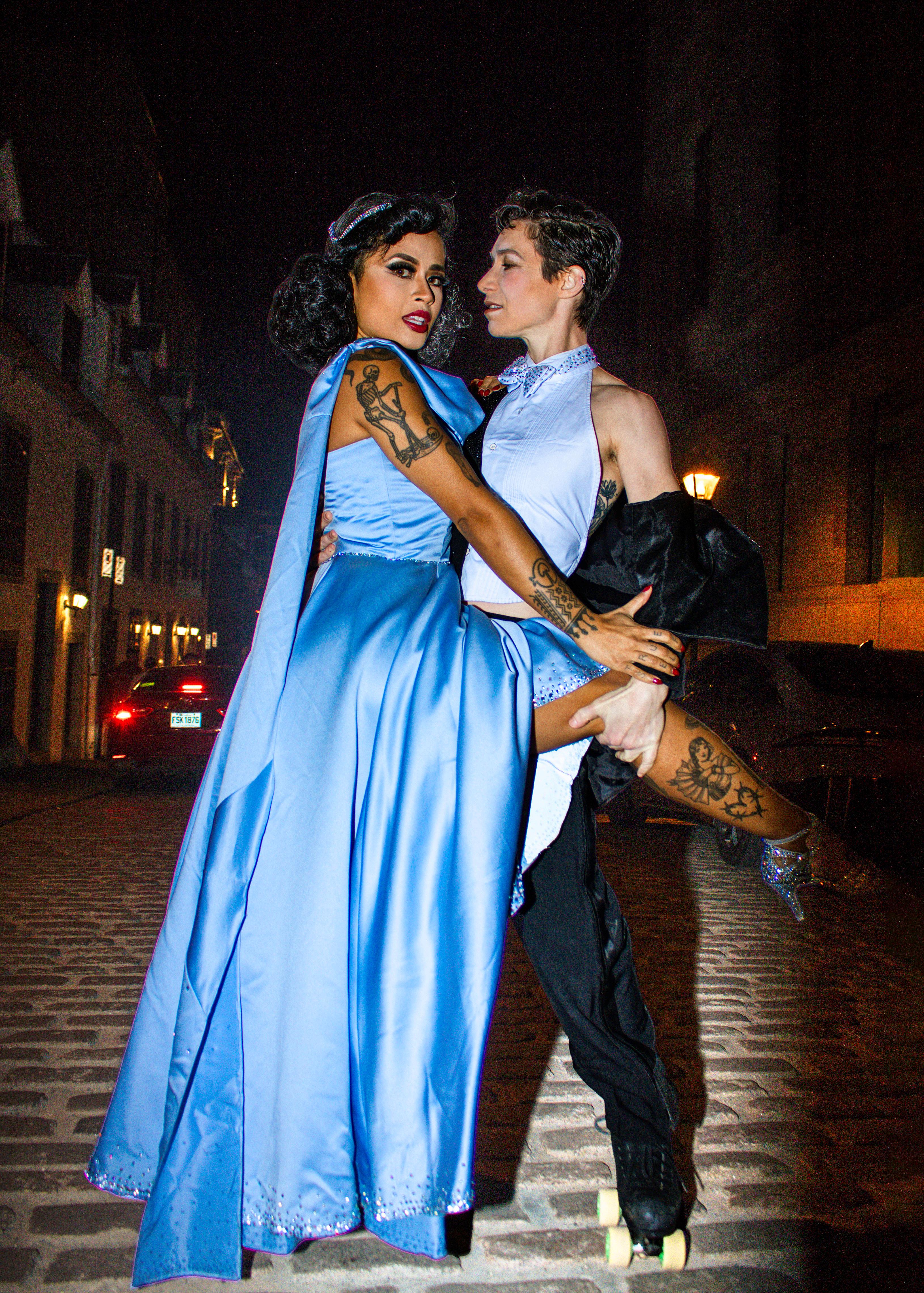
Volume 44, Issue 13 • April 2, 2024 • thelinknewspaper.ca "Bofa my small breasts" Since 1980 CONCORDIA’S INDEPENDENT PUBLICATION SINCE 1980
JOURNALISM IS DYING , AI IS TAKING OVER AND THE WORLD IS FULL OF DOOM!
If you’re still reading this, then why not join The Link’s editorial team?!
This ragtag bunch of misfits are still fighting the good fight, speaking truth to power and turning their frustrations into well-edited words all with a glint of hope in their eyes. It’s also just a great place to get your feet wet and make something real.
Elections for all editorial positions will be held on May 8 at 4 p.m on zoom and in person. To be eligible you need to have staff status (contribute 4 times to The Link) before the election takes place.
THE LINK’S ANNUAL GENERAL MEETING IS APRIL 12 AT 4 P.M.
Come review the past year of The Link and help us elect new board members and approve the budget. Those who are members of The Link Publication Society (all students of Concordia) are allowed to attend and contribute their thoughts and votes to the proceedings. A hybrid event via Zoom and in person at The Link’s office. Snacks and refreshments provided.
JOIN THE LINK’S BOARD OF DIRECTORS!
Be part of the behind-the-scenes, helping shape and nurture
The Link’s operations and future.
Two (2) positions are open to members at large (paying fees) and two (2) positions are open to members of the community who have had Link staff status within the last three (3) years. Candidates for the Board must present a letter of intent by Friday, April 12, 2024, at 4 p.m. to the secretary of the board of directors by email to operations@thelinknewspaper.ca

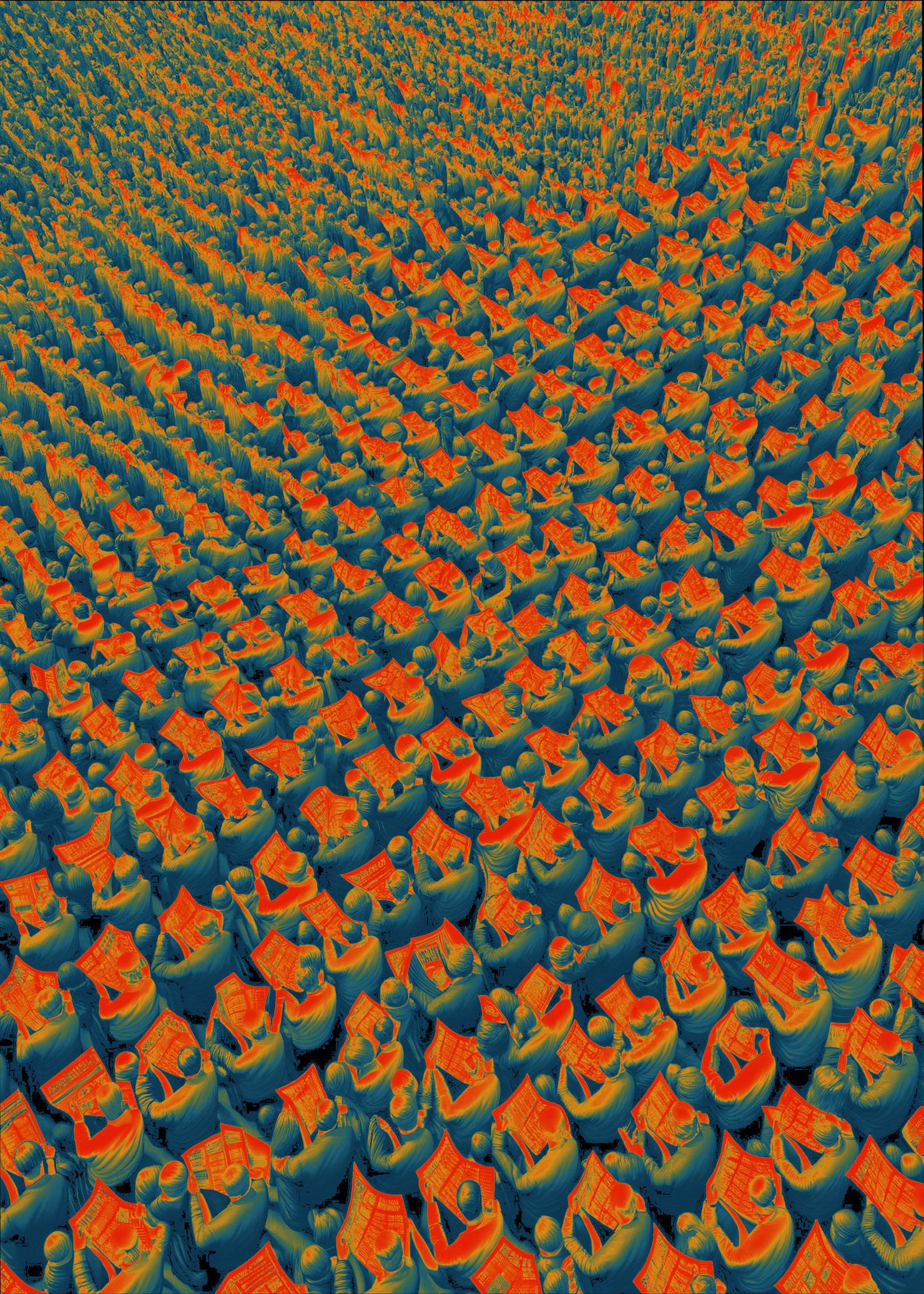
TheLinkNewspaper thelinknewspaper thelinknewspaper
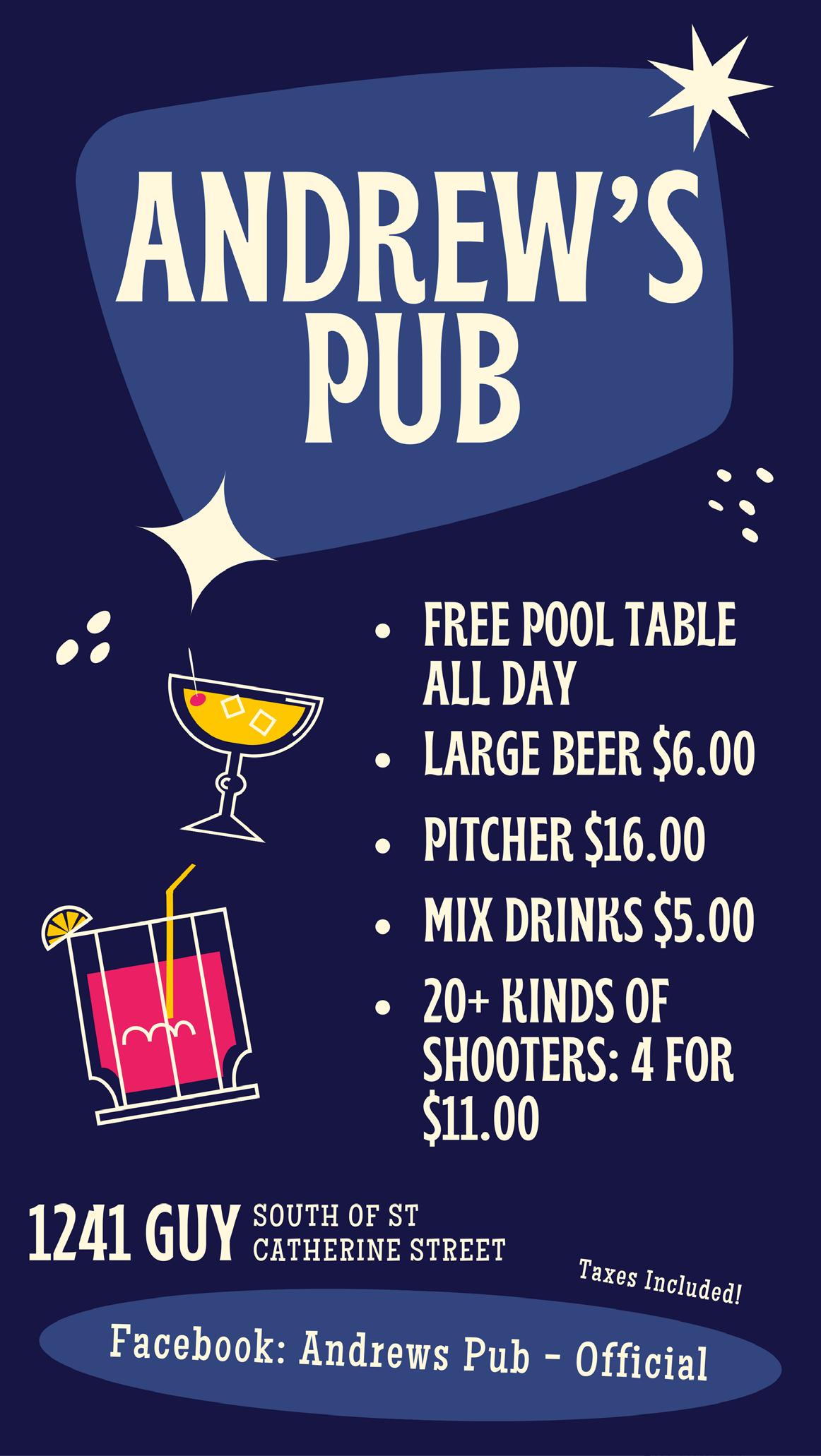
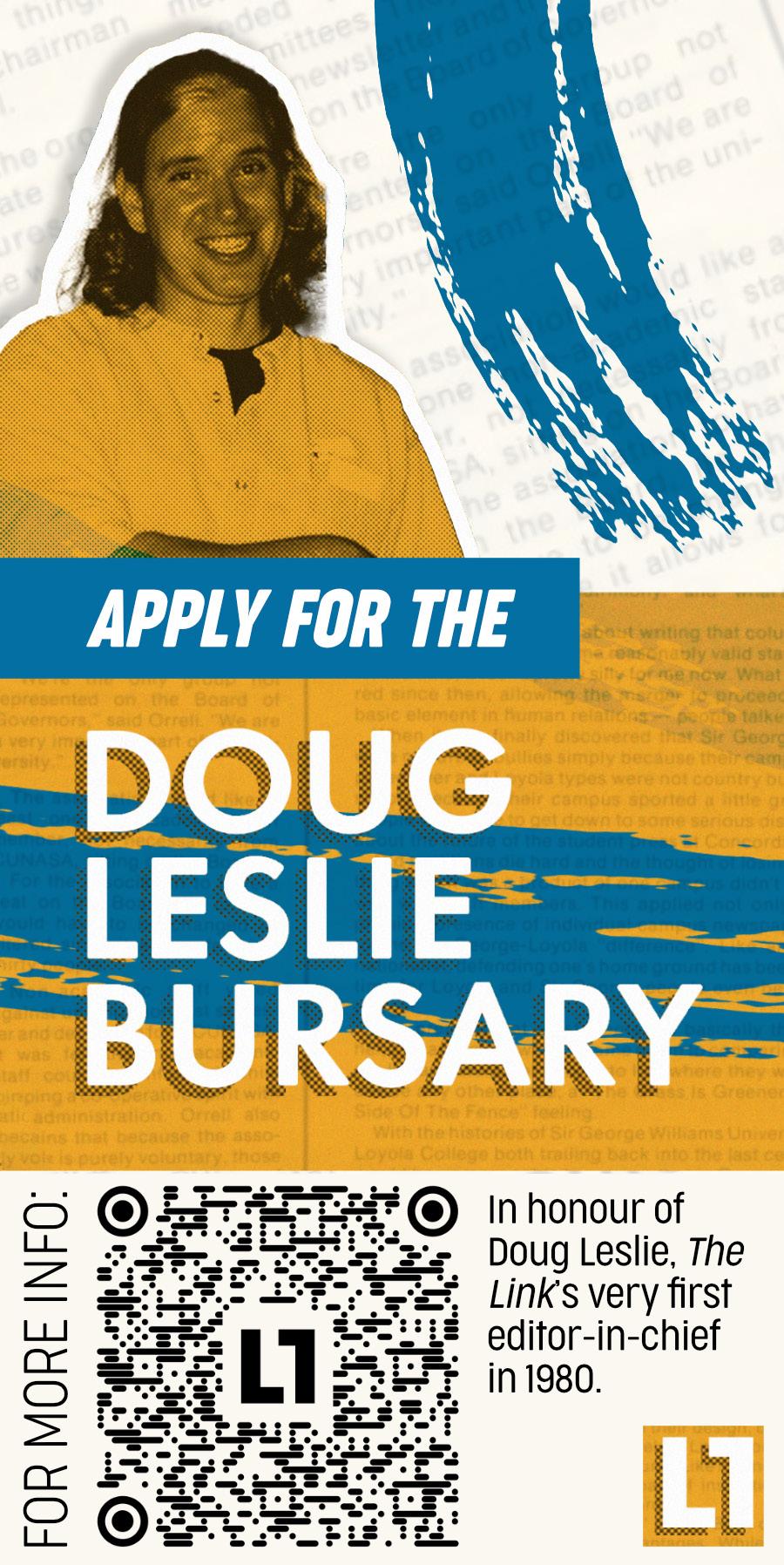

 MASTHEAD ELECTIONS
MASTHEAD ELECTIONS
AGM BOARD OF DIRECTORS linknewspaper thelinkmtl
Secularism in action
Bill 21’s consequences on Muslim women wanting to teach in Quebec
Fatima Khan is the definition of a powerhouse, with an indestructible dedication to her passion as an art educator. However, due to Bill 21, Khan’s devotion and skills are lost to Quebec’s educational sector.
Khan's current norm consists of working more than 12 hours everyday, five days per week, with her weekends booked up with a part-time job. Anytime Khan finds herself in a rare moment of quiet, she leverages her peace to prepare her art lessons for her students.
She is about one month away from graduating with a degree in art education specialization at Concordia—her second degree from the university.
"It's so intense, I don't know how I am doing it," Khan said, exhaling.
To graduate, Khan must complete four internships for her degree: two at an elementary school and two at a high school. She must accomplish 700 hours in internships throughout her entire degree. Her final year consisted of 140 hours in her fall semester and 350 hours in her winter semester, all while still attending classes, keeping up with course material, preparing lesson plans for her students and maintaining a steady income by working from 11 a.m. to 5 p.m. on weekends at a library.
Most days, she leaves her house at 7:15 a.m. and doesn't get home until close to 9 p.m.
By their second internship, students in the art education specialization can begin substitute teaching, or in other words, start getting paid for the work they already do.
Khan was eager to start substitute teaching. To become a registered substitute teacher, she had to fill in the required documents with the help of her supervisor or principal, and Khan did just that. However, overcome by busyness, Khan couldn't complete the forms.
She would try again the following year, just in time for her final internships.
Khan started her final internships in September 2023. She taught two classes per week in the fall semester and, in the winter, led a total of seven arts classes for five days per week.
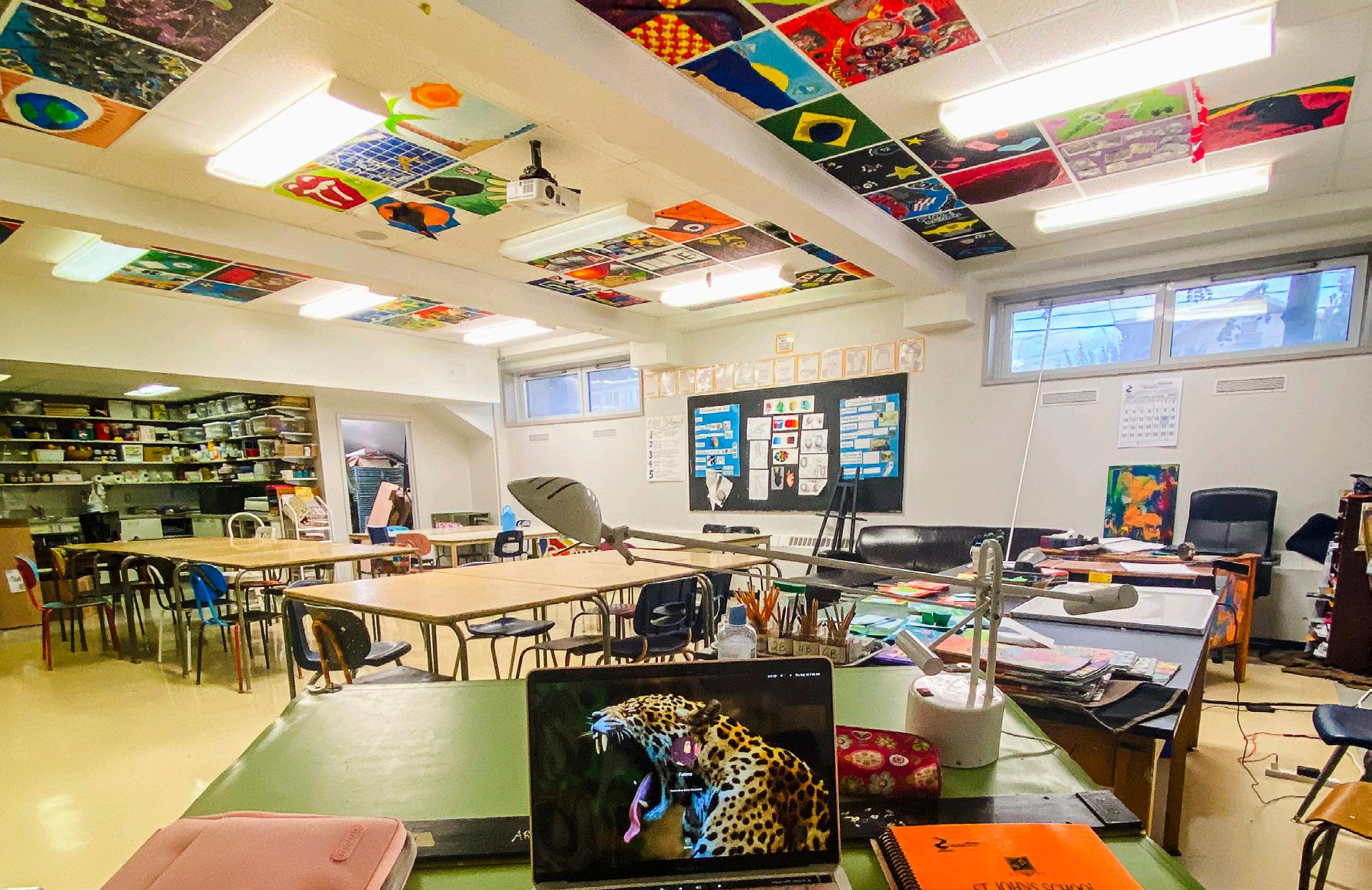
school is well known to her, as are the staff, the community and the space. She could have chosen any school but chose St. Johns for its familiarity.
With one placement to go, familiar faces, and a comfortable environment where she'd frequently be teaching, Khan felt it was time to try again with her substitute teaching application. Upon giving her completed forms to the school's secretary, the secretary assured Khan that she would have nothing to worry about; her forms would be taken care of and she was on the cusp of becoming a registered substitute.
About an hour after submitting her forms, the secretary came to the art class Khan led. "The principal wants to see you," she told Khan.
your hijab on the days you show up to school as a substitute?" said Lauzier, according to Khan. This meant Khan could wear her hijab on days she is interning, yet she must set aside her faith on the days she is substitute teaching and being financially compensated.
Khan was appalled.
To Khan, Lauzier knew of her Muslim faith and knew removing her hijab was not an option.
"To answer your question, no, I will not be removing my hijab on the days I will be subbing or anywhere else," replied Khan.
"Well, if that is the case, then I have to apologize and abide by the law. And I cannot hire you," Khan recalled Lauzier responding.
Khan then asked Lauzier if she could at least put her name in
Right now, we are trying to fight this discriminatory law, and you are not being supportive.'"
What enraged Khan the most about this interaction, which she considers racist, was the principal’s lack of care.
"If I can't teach, and I know I can't teach here, the least you could do is support me in this whole process,” Khan told The Link Khan at least hoped Lauzier would pretend to show solidarity by trying to speak with the school board and seeing what she could do. Yet being told upfront that she could not be hired because of her hijab left Khan disheartened, questioning the time and effort she had put into St. Johns.
"I'm giving so much," said Khan. "She could have just pre-
" Any violation of an individual's conscience is unethical. The conscience of the individual must be given priority. That's the essence of liberal democracy"
Julius Grey, constitutional lawyer

have representation in the classroom. "For Colleen to make that decision without even a second thought for me or the students or the community was very evident of a privileged place," said Khan. "When you are privileged enough, you don't have a second thought for the other person's struggle."
Bill 21 was established in 2019 and declares Quebec a secular state. The law prohibits public sector workers in positions of authority from wearing religious symbols on the job, such as judges, police officers and teachers. Those exempt from the law include members of the national assembly and public sector workers employed before March 2019 as long as they remain in their positions.
"I can do my internship totally fine because I am not getting paid. But suddenly I want to sub, I want to teach, my hijab is an issue," Khan said.
Khan recounted multiple scenarios where she primarily led the classes, and the teacher would sit back and supervise. "You tell me, how is that fair?" said Khan. "I will take full responsibility of the entire class, and someone else will come just to sit there. And then they get paid?"
To Julius Grey, a constitutional lawyer for about five decades, the contradiction Khan describes "is classified under the rubric of idiocy."
Idil Issa, a Muslim law student at McGill University, who founded Femmes Musulmanes du Québec, believes Khan’s situation is a prime example of "how impossible it is for Muslim women to create their careers as teachers in Quebec right now. It is just so impossible, so unfair. Even if she is super qualified, she is met with these tumbling blocks.”
At the time, the principal was Colleen Lauzier, who already knew most of Khan's siblings and her parents.
Khan had no idea what to expect of her summoning; what came next never even crossed her mind.
When Khan sat down with Lauzier, the principal began explaining the parameters of Bill 21 to her. Khan recalled Lauzier underlining how she could not be hired and that there was no point in submitting her documents.
the system so that if the law were to be abolished, Khan could start substitute teaching.
Khan recounts Lauzier's denial again, saying, "Fatima, if the law were to be abolished, I would hire you right on the spot, even if the documents were not entirely completed. You would have my full support."
Lauzier's comments confused Khan, "I was thinking, 'Why would I need your support then?
tended or been a little more sympathetic. She could've made that little gesture of kindness."
Khan questions working in a "community setting" when its foundation is based on exclusion and secularism. She noted how barring her from teaching impacts her and the students.
When it came time for Khan to choose her final internship placement, her decision was a no-brainer. Khan sought to finish off strong at the English primary and secondary school St. Johns in Saint-Jean-sur-Richelieu, where she and a sizable chunk of her family are former students. The Continue
"Fatima, if we were to hire you, would you be willing to remove
By the time I graduate, I am going to be a qualified art educator, I don't need your support then.
"Right now, in secondary three, there is a student who is fairly new and Muslim. When I'm in class, his face lights up because representation matters," Khan said.
Growing up, Khan did not
Issa noted that the law creates a norm within Quebec society of who is a good citizen. "To be a good citizen, you are not allowed to publicly express your faith," she said. "It creates an environment of permissiveness. Because the government introduced Bill 21, people who may be Islamophobic, antisemitic, really have a sort of green light in order to continue with their views and goals. If there is a law that actually enshrines these values of intolerance, then individuals really feel enabled to express those Islamaphobic views because the government is really co-signing that type of view."
Bill 21 was recently challenged in the Quebec Court of Appeal, with many advocates stressing that
NEWS April 2, 2024 • NEWS 3 thelinknewspaper.ca
on p.4
Hannah Vogan @hannahvogann
FATIMA KHAN'S CLASSROOM AND CLASS MATERIAL. COURTESY FATIMA KHAN
Continued from p.3
the law is unconstitutional and infringes on section two of the Canadian Charter, which guarantees everyone's right to freedom of conscience, religion, thought, belief, expression and so on.
"Any violation of an individual's conscience is unethical," argued Grey. "The conscience of the individual must be given priority. That's the essence of liberal democracy."
In February 2024, the court ruled Bill 21 constitutional after exacerbating the use of the notwithstanding clause, which protects legislation from most court challenges over violations of fundamental rights.
"There is no doubt that if there was no notwithstanding clause, this would be struck down in five minutes," said Grey, one of the intervenors on behalf of the plaintiff for the recent appeal. He argued before the court that the law was unconstitutional. "What the Bill does is it says 'this law operates notwithstanding the charter,' both Quebec and Canadian charter."
"It's insane to me," Khan said of the court upholding the law. "When you let them step over the constitution, where are we going with our freedom of expression? It hinders it."
Khan's colleagues who were to be interviewed for the article were not permitted to speak to The Link, nor was The Link permitted on St. Johns' premises.
"[The school and Board] talk about all of this diversity, and they talk about all of this accountability, all of this fancy stuff that only looks good in books. But when it comes to a controversial situation like mine, then they just want to sweep it under the rug and not talk about it," Khan said.
The Link contacted Lauzier and Riverside School Board (RSB), which administers St. Johns, to comment on the principal’s encounter with Khan and the board’s stance on equality and diversity.
The statement received, penned by Lucie Roy, the director general of RSB, was written on behalf of the school board and Lauzier. The statement reaffirms RSB’s stance of valuing and honouring "all faces, voices, realities, and experiences, and ensure that ours is an organization where children, youth and adults are acknowledged, respected, welcomed and empowered. We commit to the ongoing work required to keep equity and inclusion at the forefront of our reflection and decision-making [...] Supporting equity, diversity and inclusion is an ongoing endeavour at Riverside."
The statement continued highlighting that RSB is compelled to abide by Bill 21 and strive to apply the law with sensitivity and compassion. The statement concluded with the Board denying Khan's recollection of events, writing, "Conveying this information was perceived as a
request to remove a religious symbol which was not the case," adding Lauzier navigated the legislation with "great care and respect."
However, according to Khan, the request to remove her hijab is far from false. She feels the denial of her claim confutes their statement. “Stop promoting diversity, because you really don’t believe in it. When somebody is speaking up for justice or against discrimination, you shut it down right there,” she said.
March 28 marked the final day of Khan's internship and possibly the last time she would ever lead a class at St. Johns or in Quebec again. Typically, following graduation, interns are invited to teach at the schools where they worked, and if it weren't for Bill 21, Khan would continue to work with the school where she and her family had deeply rooted themselves.
"I don't have a choice but to leave Quebec," said Khan. "If I can't teach. If I cannot continue to pursue my career and my goals and my passion, what am I doing here?"
After graduation, Khan will move away from her home, siblings and parents. She has family outside of Quebec and plans to move in with them to begin teaching the subject she loves most.
Upon Khan's departure from St. Johns, she had to explain to her students why she would not be returning. Khan shared how her
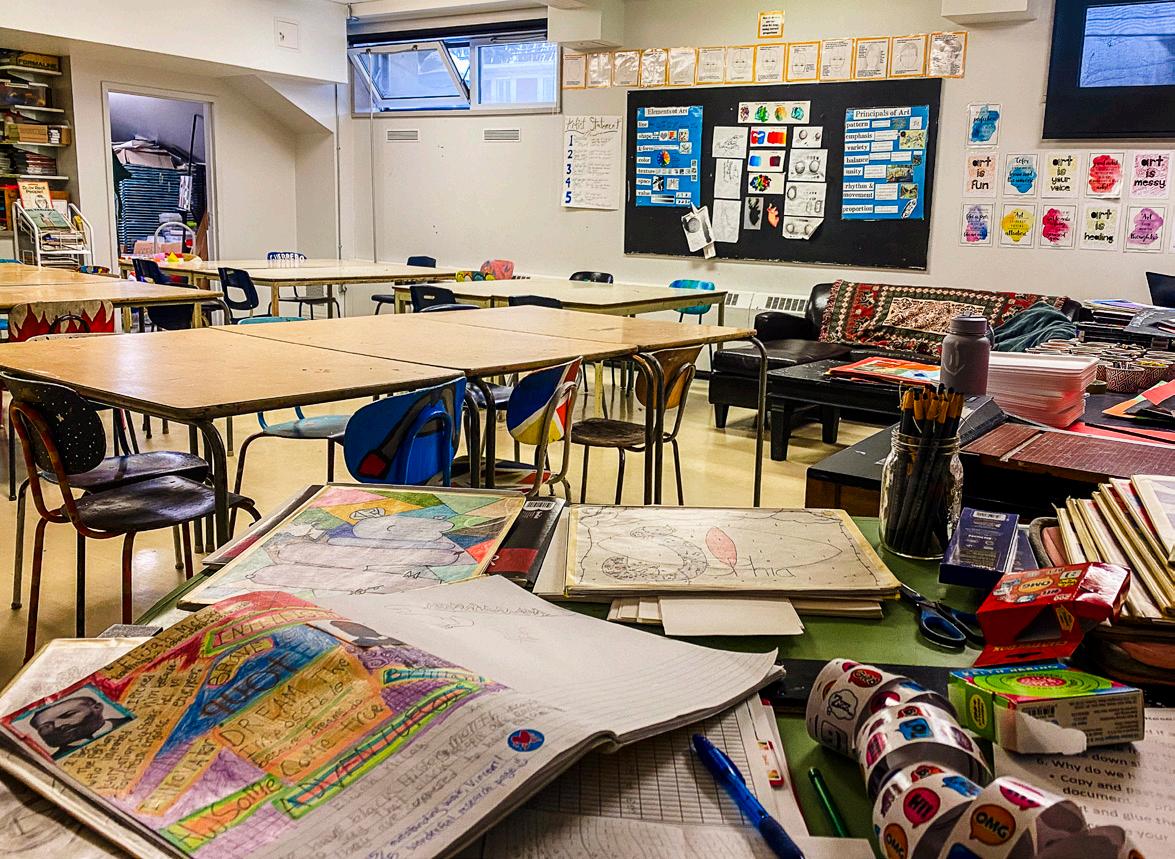
students were heartbroken that she wasn't able to teach because of her hijab. In her three months interning at St. Johns, Khan noted how the students really took to her.
"You can see it in the students; if I was not a good teacher, if I was not fit for this [they would not have this reaction]. They all enjoyed having me as their teacher," Khan said.
Many of her students did research on the law because of Khan's situation.
"If I leave Quebec and I didn't speak up about this law, I would have this huge regret. I want to speak up, even if things don't change or stay the same or get worse. At least I know I did my part as a Quebec citizen, as a Canadian citizen, as a human being."
Tackling gendered violence head-on
"I don't have a choice but to leave Quebec. If I can't teach. If I cannot continue to pursue my career and my goals and my passion, what am I doing here?"
Fatima Khan
The Réseau d’autodéfense féministe’s fight for women and trans people’s safety
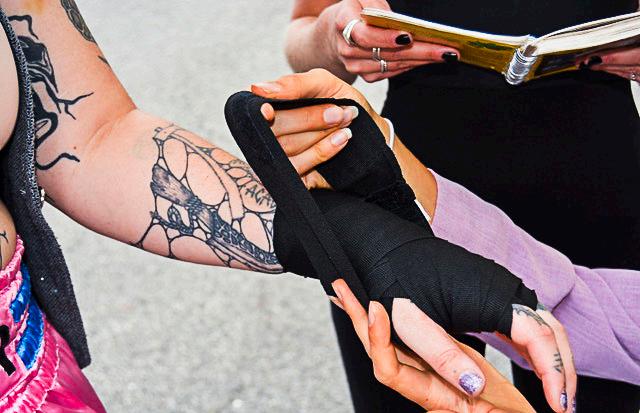
While teaching martial arts classes at Black Flag Combat Club, Woodie Choquette saw the need to build a program for gender-diverse people.
“We realized that there was a great demand from people living through gender-based violence.”
In response to the demand, Cho-
quette and other volunteers created the Réseau d’autodéfense féministe (RAF), a program under the non-profit organization Inclusion Sport. The program offers gender-diverse people an opportunity to apply self-defence in more realistic scenarios. “Martial arts did not always meet the need in which we
could not implement the day-today life scenarios,” Choquette said.
According to Choquette, while there is a focus on learning to recognize potentially violent situations, the main purpose of the course revolves around breaking isolation around victims of violence. The RAF aims to provide a space for people to talk freely and without prejudice about violence.
“It is to have places where we could talk about sexual violence and patriarchal violence with people who would have empathy and would not be embarrassed to talk about it,” they added.
The space is exclusive to trans, non-binary, two-spirited people and women from a large range of ages. The self-defence lessons are not only addressed to survivors of violence but to anyone who wants to learn how to protect themselves from any type of violence.
Transgender and gender-diverse people are 1.5 times more likely than
cisgender people to have been physically or sexually assaulted since age 15, according to the Survey on Safety in Public and Private Spaces in 2018.
The basis of the program is to prevent scenarios of violence and to promote de-escalation. “It’s a lot of conversation about how to express boundaries, how to deal with catcalling..., how to notice violence within relationships with your intimate partners,” said Sphynx Crunch, a contributor to the curriculum of the self-defence courses.
These courses also aim to “help more people feel safe and comfortable, developing a sense of agency and feeling safe in their bodies,” she added.
The program offers the support and training necessary to fight back against any type of violence with physical, emotional, psychological, and verbal self-defence techniques, through a 12-hour program taught monthly by two to three coaches simultaneously. Spots are limited
Laura Bolanos
to 12 to 15 people. Each course is divided into three sections which include emotional, physical, and somatic techniques.
An essential part of the RAF relies on the coaches’ involvement in the program. Belant, who was granted anonymity upon request for safety reasons, became a coach after putting the program together with other volunteers. In her classes, she aims to validate any way participants use to defend themselves. “There aren’t good or bad ways to fight against violence,” she said. “They shouldn’t judge themselves and feel guilty for having acted differently.”
Another coach, Gauthier, also kept anonymous for their safety, makes sure everyone learns self-defence techniques that they are comfortable with using in real-life situations. After people practice, they
Continue on p.5
4 NEWS • April 2, 2024 thelinknewspaper.ca NEWS
THE ORGANIZATION TEACHES GENDER-DIVERSE PEOPLE SELF-DEFENCE. COURTESY THE RÉSEAU D’AUTODÉFENSE FÉMINISTE’S
COURTESY FATIMA KHAN
Continued from p.4
go around to see which technique they prefer and help them learn to escape from different positions.
In contrast to Belant, Gauthier got involved after participating in the 12-hour program. People are encouraged and welcome to become part of the RAF after the courses, as having coaches from different backgrounds make all the difference. Some have experience in martial arts and others in feminist intervention, and their personal experiences with violence impact their approaches to teaching, according to Belant.
“The majority of us who aren’t
cis men have experienced street harassment and experiences where our limits have been exceeded,” she said. “We shared our experiences that are rooted in us and what we’ve been through. We are all going to teach differently because of our different experiences.”
By the end of the program, people who have gone through gender-based violence will regain control over their lives and themselves through the RAF program. “I hope people will leave with a feeling of self-confidence, security and solidarity,” Choquette said.
In the long term, Choquette aspires to see structural changes in society through the program. “I
hope we can reach a point where we bring social changes that eventually mean that people no longer have the responsibility of defending themselves against violence.”
But, the ultimate goal would be that “one day violence against people disappears.”
The RAF is in the first stage of its mission. They are working on future initiatives for the program, such as the creation of affinity or territorial communities of feminist self-defence, as well as a men’s group to facilitate discussion of gendered violence and the assumption of responsibility by men.
In addition, the RAF organizes different activities such as a reading
The importance of the Student Advocacy Centre
club, screenings, and self-defence drop-in classes for sex workers. They announce their monthly activities on their social media platforms.
With the growing popularity of the RAF, they have been receiving demands from everywhere. “The demand keeps growing. We were asked to go to Quebec to train. We’ve also gotten requests from the Maritimes and Ontario,” Choquette said.
In Montreal, they are looking for a new space to welcome more people and provide an adequate area for their activities and courses.
Currently, the self-defence courses are at full capacity each month. People who want to participate in the program must register fast to secure a spot.
To register for their events and self-defence courses, visit the link in their Instagram or Facebook biography @reseau_autodefense_ feministe. For more details, they can be reached directly by email at acces.autodefense@gmail.com.
The CSU service that can help you navigate Concordia’s bureaucracy
Genevieve Sylvestre @gen_sylvestre

The Concordia Student Union’s (CSU) Student Advocacy Centre is a service that aims to help defend the rights of students by matching them with a student advocate.
The centre deals with a variety of student complaints and questions, mainly in the sphere of academic misconduct, professor-student relations, questions regarding the Academic Code of Conduct, and issues relating to the Code of Rights and Responsibilities.
Brittany Allison, the centre’s interim manager, said that advocates aim to help students understand Concordia's various policies. Student advocates at the centre can serve as representation for students who are sentenced to a disciplinary meeting.
“If you have an academic misconduct interview or a meeting with a hearing, we go, we attend, we do your opening, we do your closing, we help present your evidence and we help negotiate a sanction," Allison said.
Beyond academic misconduct, student advocates can help with filling student requests for grade re-evaluations, tuition refunds and exam referrals, among others.
Sofia Lipari-Couture, the centre’s interim lead advocate and the only full time student advocate on staff, said that students often don’t know the extent of their rights.
“Students don't know what they have access to,” said Lip-
ari-Couture. "They don't know that they can defer an exam, they don't know that they can discontinue (DISC) a class after the DISC deadline with exceptional circumstances, but these are things that we help with.”
As opposed to the university’s personal advocacy service, the CSU Student Advocacy Centre is independent and is funded by students through a fee levy of $0.48 per credit. According to Allison, that independence reassures students.
“Our interests are for the students,” said Allison. “If you're filing a complaint against somebody at the university, do you want the same people that you're filing a complaint against representing you, or do you want somebody that is independent?”
All consultations with student advocates are fully confidential and advocates cannot act against a student’s will. For Lipari-Couture, the service’s importance lies in helping students navigate situations that can be highly confusing, overwhelming and emotional.
“Students are dealing with a lot,” said Lipari-Couture. “[Concordia’s] website is not really easy to use, but we use it every day, we read the policies every day. I know the policies by heart, so if you come to me and you're in this situation, I can point you into the right direction where you wouldn't have even known where to start.”
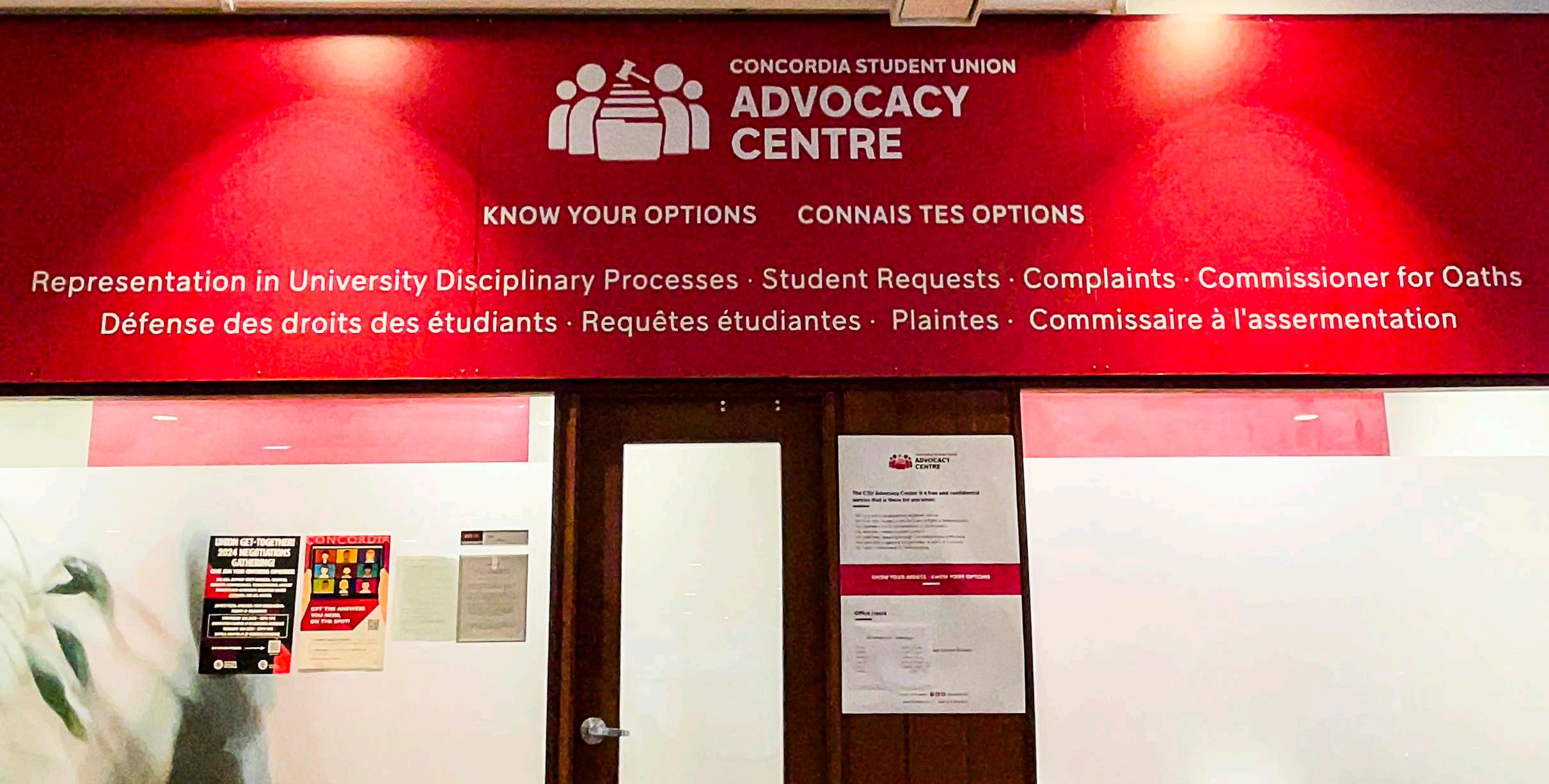
LOCATED IN THE HENRY F. HALL BUILDING, THE CENTRE AIMS TO HELP STUDENTS WITH THEIR RIGHTS.
Allison and Lipari-Couture want to push against the notion that people who seek student advocates are automatically guilty, and encourage students to reach out to the centre as a first resort when they have concerns.
“I think that's a big objective of ours, that students feel like they're not guilty to come and see us. We'll help with anything, we’ll help explain policies,” said Lipari-Couture. “We will even help you self advocate for yourself," Allison added.
Allison further explained that seeking help shows that students have done their due diligence. “We've had advisors and people within the university that have said that, when students have advocates put together their requests, it's more simple for them to go through.”
The Advocacy Centre ran for a fee levy increase in the Winter 2024 CSU General Elections. Like the other six fee levy groups that ran alongside them, the referendum question failed. According to Allison, the centre received a record high number of cases last semester and is looking to expand to meet the demand, which is partly why they ran for an increase.
Kareem Rahaman, the CSU’s finance coordinator, said that students are in a tight financial spot at the moment and the CSU will work harder on marketing its services and their importance.
“In an ideal world, no one has to use the centre because no one has any problems, but the fact of the matter is that there are a lot of people with problems who don't know where to go right now,” Rahaman said.
For Allison, it’s important for the university to have a service to help students that have a difficulty speaking up for themselves. “Concordia is so decentralized and everybody is like, ‘Well, you're an adult. You should know better. You should know how to do this,’ Nobody is ever accounting for the eternal struggles or traumatic events people suffer from in their lives that may prevent them from speaking up, that may prevent them from writing a document, the disabilities that students have.”
Students wishing to use the Student Advocacy Centre’s services can go to their office located in the Mezzanine of the Hall Building or call (514) 848-7474.
NEWS April 2, 2024 • NEWS 5 thelinknewspaper.ca
PHOTO DOROTHY MOMBRUN
McGill Hunger Strike for Palestine enters its seventh week
Students protest university’s ties to Israel as McGill refuses to divest
Kara Brulotte

Interviewed students withheld their last names for their safety.
On Feb. 13, a new student group called McGill Hunger Strikes announced on Instagram that a number of students would not eat until McGill divests from Israel. Now, over a month later, students are continuing their efforts as a part of their indefinite strike.
“What drove me to do it is really the outrage and the sadness that everyone is feeling right now and the need for something to be changed,” said Zaynab, a hunger strike member.
According to Zaynab, the hunger strike is a direct response to McGill’s refusal to listen to its students, despite criticism and protest from the student community.
“We have exhausted every single other avenue,” said Zaynab. “We tried it the democratic way and it was put on hold. We tried manifesting, we tried sit-ins, we tried talking to admin, we tried everything.”
On March 23, one hunger
striker was hospitalized and has since no longer been able to continue her strike.
“[The goal of the strike is] to get the demands of divestment met, to get back $20 million that is being invested into genocidal weapon manufacturing companies, and to have a full academic boycott of Israeli institutions,” said Kris, a member of the McGill hunger strike.
McGill University has continued to economically support companies such as Lockheed Martin, Safran and Airbus Aerospace, all weapons manufacturers, as well as several other companies that have more indirect ties with Israel, such as Coca-Cola and L’Oreal, which both operate factories in Israel settlements on Palestinian land. McGill has also collaborated with several Israeli academic institutions like Tel Aviv University and collaborations such as the McGill-Israel Entrepreneurship Program. These programs have been long protested by pro-Palestinian student groups.
Despite the protest from student groups and the hunger strike, Angela Campbell, the Associate Provost at McGill stated that will not sever ties with academic and research institutions in Israel.
In a statement to The Link, McGill’s media relations team said that “McGill respects students’ rights to pursue political objectives and express political convictions,” the statement read. “We have reminded the students that there is a process in place for expressing their concerns about any investment holding of the university.”
According to the McGill Hunger Strikes Instagram account, on March 18, McGill asked for private meetings with the hunger strikers, with a maximum of eight people present. However, the McGill hunger strikers declined the invitation, as students are adamant to host the meeting in public.
The university emailed the group to discuss an offer to meet privately, but no meeting has taken place as of the day of publi-
cation. The post adds that McGill’s administration had previously agreed to a 90-minute public meeting, but later cancelled.
“We have offered more than once to meet with them, but they have refused to meet on the terms proposed,” the media relations spokesperson said.
“Our first demands were that we want a public meeting, because it’s a public matter,” said Kris. “And it’s not just hunger strikers who have been asking and demanding for this, it’s many student groups and many people and the community as a whole.”
According to the striking students, the communication between strikers and the administration has been inconsistent, with periods of contact followed by silence for weeks. As of publication, the McGill administration has not been in contact with the group since March 18.
“At one point, communication was cut off for 19 or 20 days so nothing from the McGill administration for 20 days while students were starving,” Zaynab said.
The McGill administration has repeatedly wished the hunger strikers well, despite the lack of change and cooperation. However, their continued inaction has led to frustration and outrage from many, expressed through repeated support for the students.
“I think they’re very much an institution, like many others, that really only care about money,” said Kris. “I’d say they’re more of a corporation than a space of education.”
According to the statement from McGill University, they “continue to work daily on this issue,” but since change is not evident, at least in the present time, the hunger strike will continue indefinitely, connecting more and more with the Canadian and international community.
“What’s happening with the Mohawk Mothers, with the hunger strikers, it’s getting global attention,” Kris said.
The hunger strike has also collaborated with other pro-Palestinian student groups, sharing resources and working together towards their common goals.
“All the protesting groups on campus, we’ve been in contact with them, we’ve worked with them and it truly has been a great proof of unity,” Zaynab said.
The support for the hunger strike has been widespread, with the group’s Instagram accumulating more than three thousand followers in a little more than a month.
“Just the response of so many organizations and people willing to help and offer space and time and commitment in some form, I feel a lot of hope in our movement,” Kris said.
The McGill hunger strike has no set end date and no clear end game, as the McGill administration has yet to meet the strikers’ demands. In the meantime, the strikers continue to experience and document the serious health issues that ensue on their Instagram.
“We tried it the democratic way and it was put on hold. We tried manifesting, we tried sit-ins, we tried talking to admin, we tried everything.”
Zaynab, Student Hunger Strike Member
6 NEWS • April 2, 2024 thelinknewspaper.ca NEWS
MCGILL STUDENTS AND HUNGER STRIKERS SEATED ON THE STAIRS TO MCGILL UNIVERSITY. COURTESY MCGILL HUNGER STRIKE
In preparation for a protest
Learn the fundamentals of protest coverage

ou'll need:
Y- Camera
And that's it! That's all you really need to go out and cover a protest. Of course, more gear can always help.

Hundreds gather for trans day of vengeance
Montreal’s queer community united against Quebec’s transphobia
On March 31, around 700 demonstrators marched from 600 Fullum St. through downtown Montreal, donned in transgender and non-binary colours.
The protest was organized by the group Nous ne serons pas sages, and dubbed the “trans day of vengeance.” The group’s name is a play on words on the Coalition Avenir Québec’s (CAQ) “comité des sages,” or wise men committee.
In light of trans visibility day, various transgender, queer, and allied people demanded the axing of the committee, meant to advise the provincial government on gender-related topics.
Protesters denounced that the committee does not include a gender-diverse person, and that subsequently, the decisions carried out aren’t representative of the gender-
queer community in Montreal.
One speaker cried out, “In creating this committee, the CAQ enables the latest wave of transphobia that has been rising everywhere around the world.”
The protest made a stop next to the Radio-Canada offices, where attendees expressed their frustration against the “Trans Express” documentary that aired on Feb. 29. The video has received nationwide backlash for its transphobic messages, such as calling young trans men who seek out gender-affirming care “little girls who often struggle with mental illness.”
Demonstrators held signs reading “Transphobia kills,” and “No discussion on trans people without trans people” while chanting “Everyone hates transphobes.”


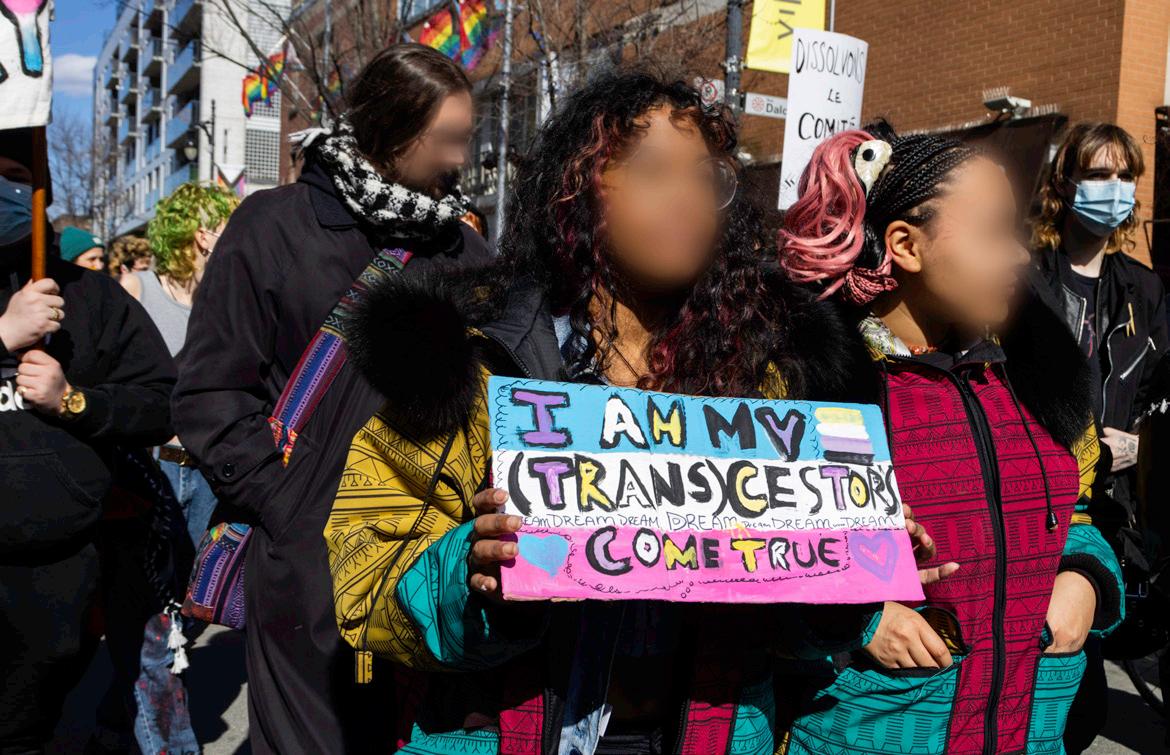


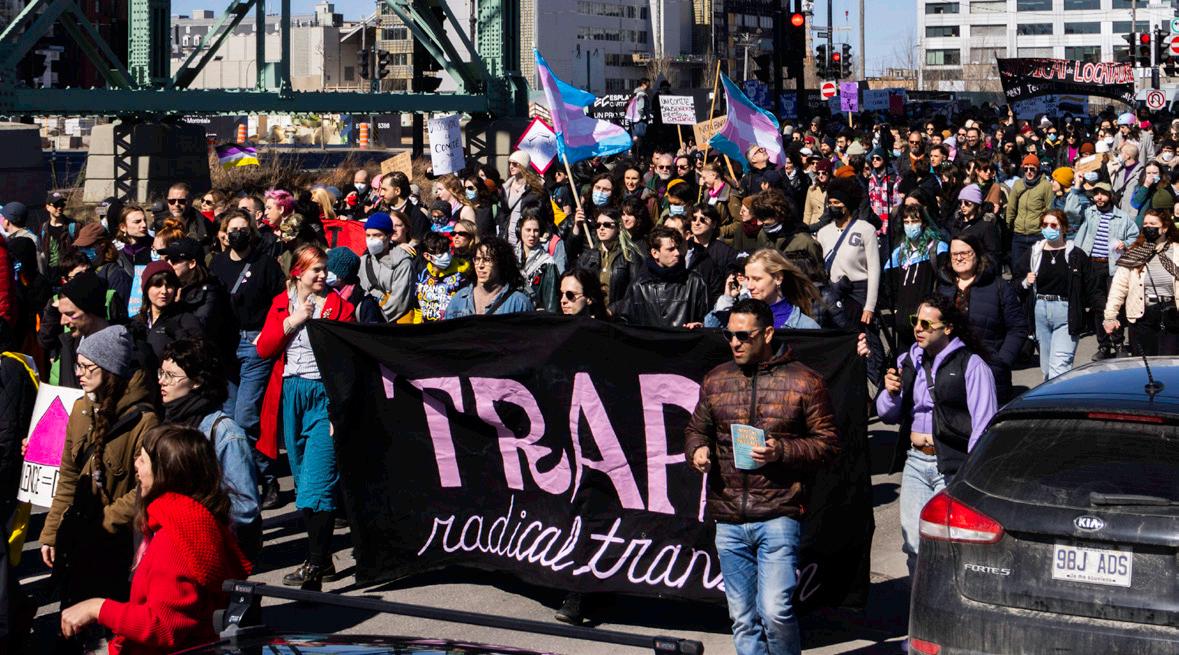
NEWS April 2, 2024 • NEWS 7 thelinknewspaper.ca
AROUND 700 PEOPLE GATHERED ON MARCH 31. PHOTO ANDRAÉ LERONE LEWIS
TRANSGENDER, GENDER QUEER PEAOPLE AND ALLIES WERE UNITED UNDER THE FIGHT AGAINST PROVINCE-WIDE TRANSPHOBIA. PHOTO ANDRAÉ LERONE LEWIS
PROTESTERS DENOUNCED THE CAQ WISE-MEN COMMITTEE AND ASKED FOR ITS DISSOLUTION. PHOTO ANDRAÉ LERONE LEWIS
TERFS, TRANS-EXCLUSIONARY RADICAL FEMINISTS, OPPOSE TRANS INCLUSIVITY. PHOTO ANDRAÉ LERONE LEWIS
Andraé Lerone Lewis @enorelwodahs
Andraé Lerone Lewis @enorelwodahs
GRAPHIC PANOS MICHALOKOPOULOS
GRAPHIC MARIA CHOLAKOVA AND PHOTO ANDRAÉ LERONE LEWIS
Denim Dreams
The aspirational magic of Joshua Onazi's One Eye Sees
he first conversation between
TThe Link and Joshua Onazi began with a bass guitar.
Onazi is a Concordia student and founder of the clothing brand One Eye Sees. Of his playing abilities, he said, "if you start with only a little bit, you can play around with that and use it [...] And it's the same thing with my art."
Onazi’s philosophy becomes apparent when one considers that, prior to buying his first sewing machine during the height of the COVID-19 pandemic, he had zero experience with clothing construction. Aside from technical drawing skills, which he picked up in high school and now uses when patternmaking, the engineering student-turned-designer insists that “there is no masteryyou just have to know what you like and go with that.’"
At the beginning of the pandemic, Onazi described feeling empty.
"Everyone felt bad, obviously, but I'm an international student so I didn't get to see anyone for so long," Onazi said.
Onazi is Nigerian, and the intense loneliness he felt while in Montreal was a far cry from the "vibrant community" in which he was raised.
During the 2021 lockdown, Onazi observed that his friends had begun using their extra time to kickstart passion projects, and, motivated by their proactive approach, decided it would be really cool to try and start something of his own.
He took inventory of his interests during a phone call with his sister. "I was just like, 'Well, what do I like? I like clothes. What do I need? A machine.' So I bought a machine on the phone," Onazi said.
"During quarantine, sewing saved me," he said.
Once the machine arrived, Onazi began creating clothes, starting with a pair of pants that he wasn't confident to wear outside his house. An opportunity to showcase his early work quickly arose with the African Student Association of Concordia. "They told me I had creative liberty to do what I wanted which allowed me to eliminate [any] expectations of what art should be," Onazi said.
The inaugural collection from One Eye Sees, titled The Journey of a Star, sees denim deployed as its primary textural and aesthetic reference point, with floor-length dresses crammed full of evocative motifs, Levi ties and reworked jean jackets. An original poem accompanied the collection's
launch on Instagram. The lines "I cut along the template of the chalk constellations, And stitch the fabric of the culmination of ideas" best embody the transcendent ambitions that permeated the brand's early experiments.
Onazi describes the first collection as a vehicle for reflection, a lens through which people could look back at where they came from, internalize it, and create a conversation with themselves. He acknowledged that audiences may have difficulty connecting with his concept at first, but that's all part of what he believes makes the brand unique. "It's about creating. When I come to a blank canvas, it’s almost like I'm blind."
Ultimately, One Eye Sees asks people to "come to themselves and see what they find."
The Journey of A Star, assembled from thrift store scraps and on-campus donations, was important for another reason: it solidified Onazi's desire to create a brand centred around an ethos of sustainability rooted in slow fashion, a practice focusing on ethical production methods.
A newfound appreciation for the hours and intense labour required to make a piece of clothing, coupled with the fact that pieces “never fit,” means you'll never see Onazi buy fast fashion.
"The people who make [items for H&M or Zara] aren't making dollars, they are making cents," he said. "I know the work, and I know what it takes to make a garment so I feel like it should be appreciated." An effort to sell select items from the brand’s early line saw clothes going for several hundred dollars.
While Onazi is fixed at the creative helm of One Eye Sees, his friend Victor Okoro, a student in Concordia's computer engineering program, remains a close creative collaborator and was an early supporter of One Eye Sees. In addition to sourcing fabrics and other materials ripe for transformation, Okoro said he also brainstorms concepts, helps design pieces, cuts and reassembles materials and “also carry stuff around.”
Okoro and Onazi met in their first year at a football game. "We're both Nigerian, so that's kind of how we bonded, and we've been friends since," Okoro said.
Between his two jobs, flag football and soccer games, Okoro says he loves to dress up and thrift with Onazi whenever he can.
Okoro described the early days of what became One Eye Sees as
Jessica Hungate
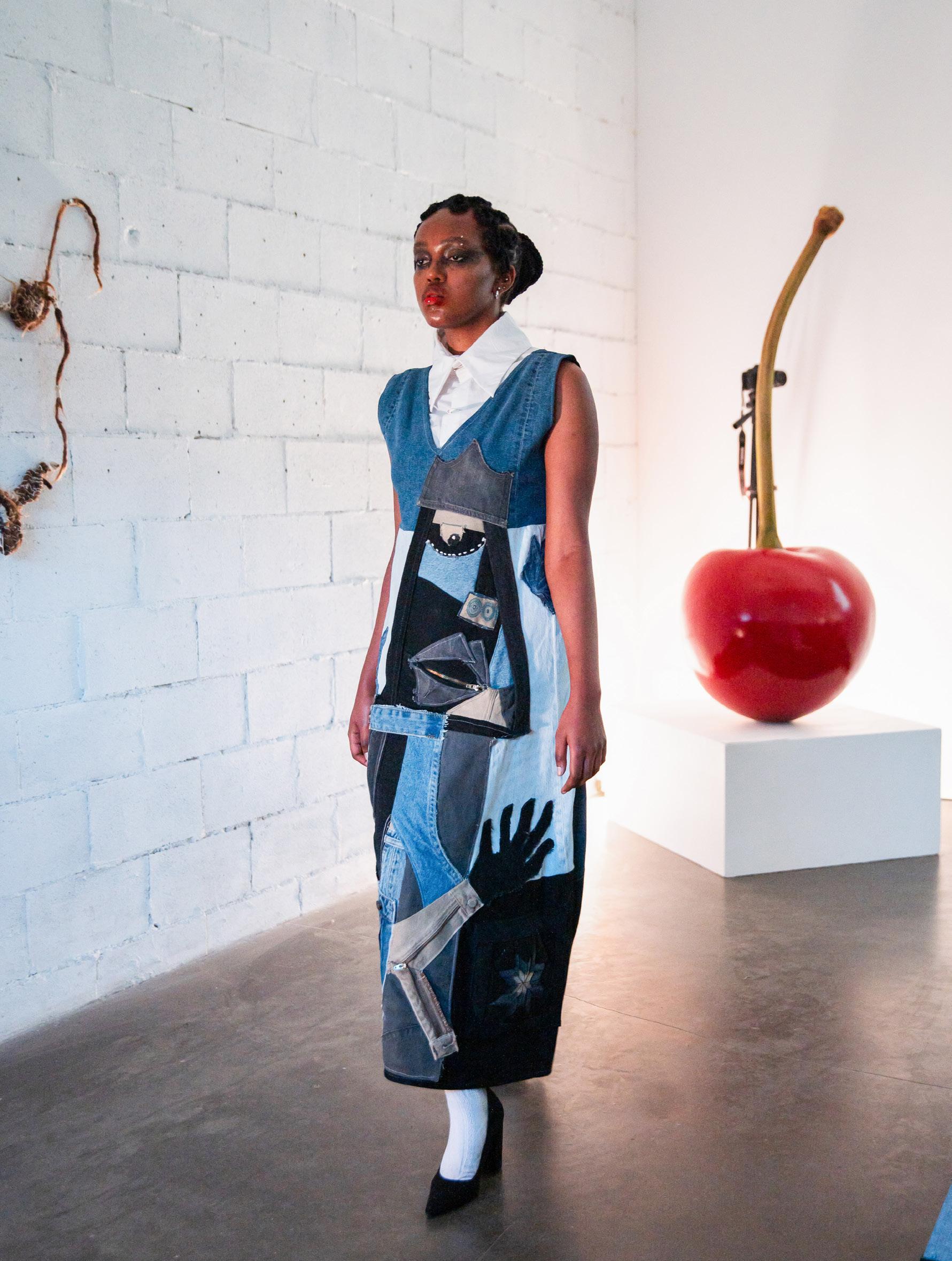
an experiment in upcycling.
"I remember I would go on my skateboard and pick up ten or 20 pairs of jeans, and take them over to Joshua’s place and cut them up," Okoro said.
When asked about the attraction to denim, Okoro's answer was simple: "It's cheap, it's sustainable, and you can always find denim."
The question of whether One Eye Sees has any commercial future is a more complicated matter. It's a conversation Okoro and Onazi have returned to repeatedly over the past few years, and one which hasn't yet yielded a concrete answer.
"Most of the stuff we have now was supposed to be sold last year but didn't, for various reasons," said Okoro. "Right now, I think Joshua is just trying to do more
shows and exhibits, so there's more emphasis on visual rather than wearable art."
The duo attempted a foray into retail recently at an artist collective in Little Italy called Chaque Mois, with mixed results. Both Onazi and Okoro visited the store often, and Okoro admits it was "cool to see people's reaction to the clothes."
When The Link probed Onazi in early March about his next project, he confided that he had already come up with a title and was working out a concept.
"I don't even know if I should say this, but I want to call it It's a War Outside. It won't be an entirely new collection, but more so an update of my first collection," Onazi said.
A few weeks later, The Link received an invitation to Onazi’s newly
named showcase presented by Art Matters, North America's largest student-run arts festival, titled Luxury Goods, Luxury Bads, set to premier his latest creative effort.
At Produit Rien, the gallery chosen to host Art Matters and its leather-clad milieu, elaborate operatic trills accompanied the models as they sauntered slowly across a makeshift runway punctuated by several sculptural installations which included, among other things, a metre-high cherry and a table set with frosted cakes and layers of sherbet a là Marie Antoinette.
The room seemed to collectively hold its breath as Onazi's clothes made their way across the Continue on p.9
FRINGE ARTS 8 FRINGE ARTS • April 2, 2024 thelinknewspaper.ca
ONE EYE SEES WEARABLE DENIM ART PIECE ON DISPLAY AT PRODUIT RIEN. COURTESY RORY CREELMAN
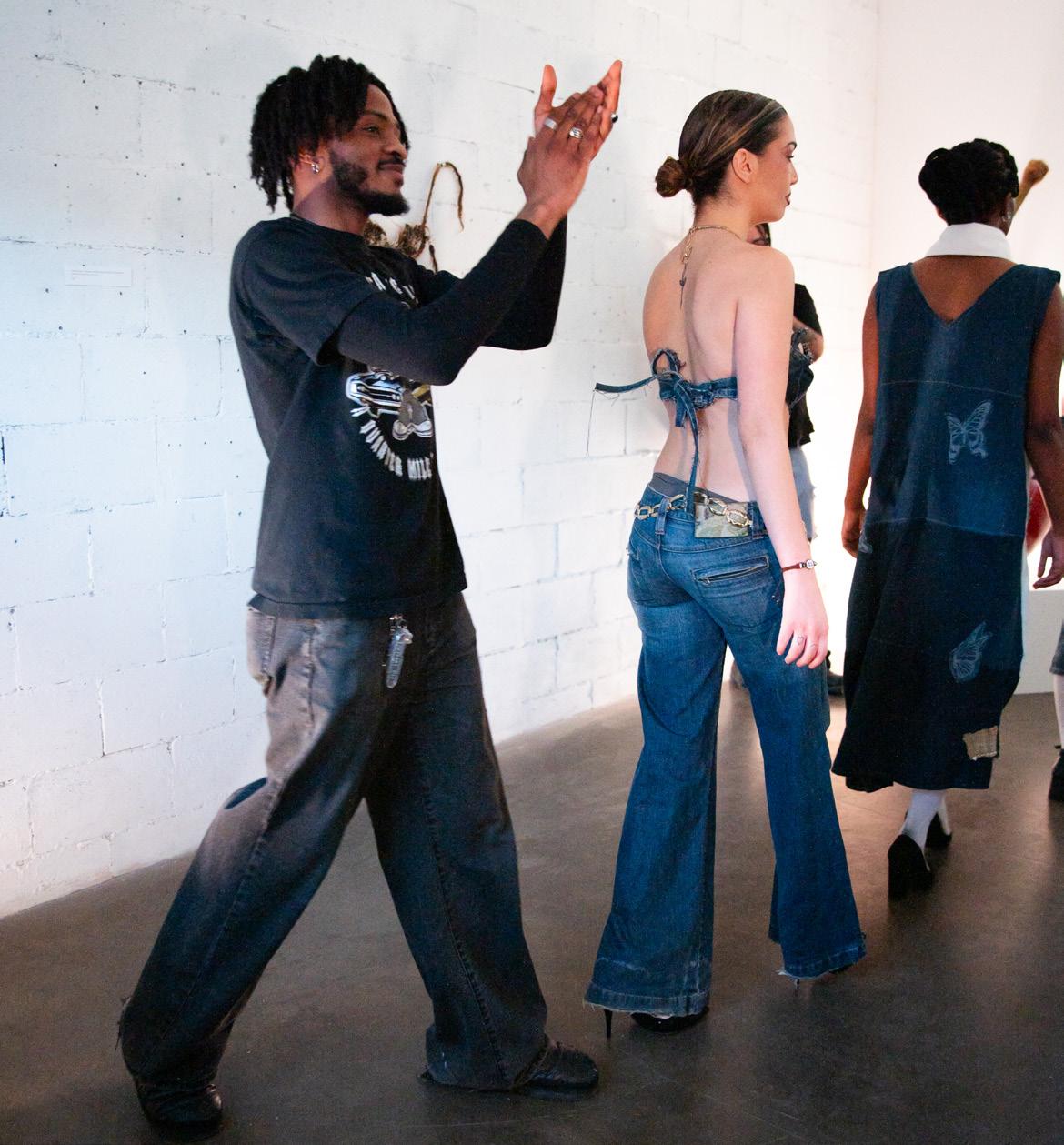
Continued from p.8
"I know what it takes to make a garment so I feel like it should be appreciated."
Joshua Onazi
room. Guests spilled out of the gallery and onto the adjoining street, as students wearing everything from oversized patchwork trench coats to fishnets and hand-painted clogs craned their necks to catch a glimpse of the clothes.
Cooking for a cause
Mama Khan's Iftar gatherings fuel social impact
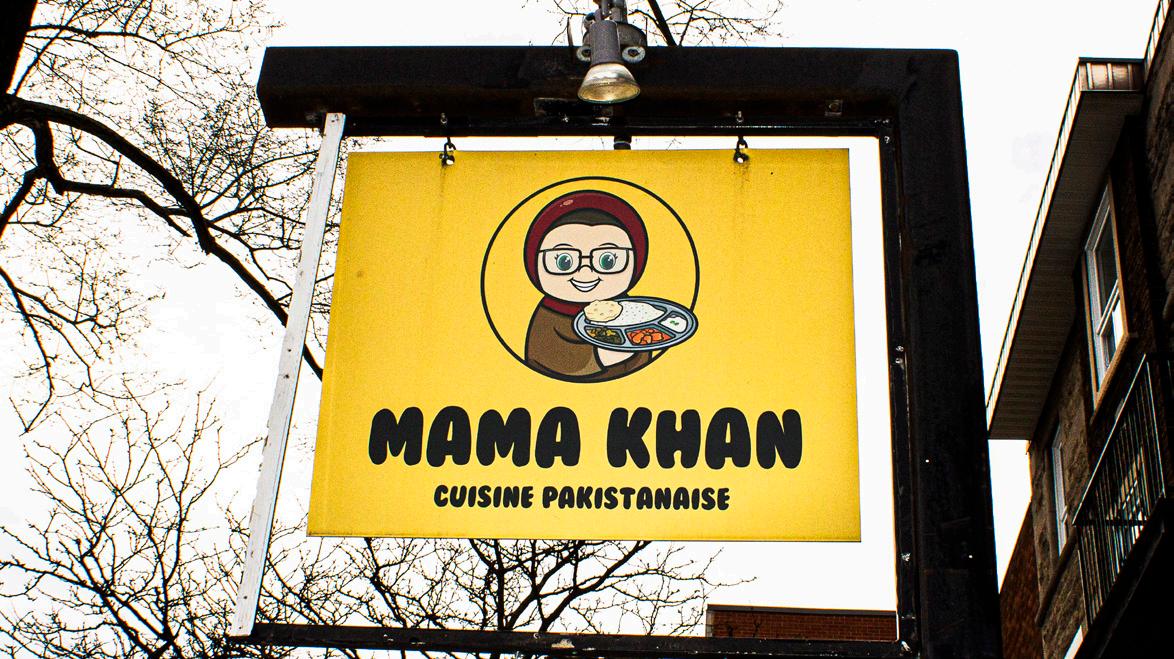
Providing nourishment, comfort, and a sense of belonging to those in need, Pakistani restaurant Mama Khan's initiatives extend beyond culinary delights to create a positive impact.
For the month of Ramadan, Mama Khan is offering special Iftar boxes as part of their ongoing charitable efforts. These Iftar boxes provide a complete meal experience, including appetizers, main courses, desserts, and drinks, allowing patrons to break their fast with nutritious and delicious food.
The restaurant is continuing its commitment to giving back to its community during Ramadan by donating a portion of the proceeds from the Iftar boxes to charitable causes.
Through these initiatives, Mama Khan aims to foster a sense of unity, compassion, and generosity while providing nourishing meals to individuals and families observing fasting traditions.
Owner Abdul Raziq Khan ex-
plained that his restaurant’s journey took off as a ghost kitchen during the COVID-19 pandemic. They started with the intention of testing the waters, unsure of whether it would be successful or not. However, they received exceptional feedback, prompting them to expand their operations to a physical location on St. Denis Street.
“We actually started two doors down,” said Khan. “We started there in a small area and we would get a lot of people and sometimes we would get overbooked. So, the previous person who owned this space approached the restaurant and asked if we wanted a bigger space.” The restaurant has been at 4135 St. Denis St. for nearly a year and a half.
The restaurant’s name pays homage to Khan's mother, who serves as its head chef. “I reopened Mama Khan on her birthday, Oct. 13, so it is also our annual opening,” Khan added.
Over time, Mama Khan evolved its menu and dining ex-
The clothes appeared fiercely tailored but, unlike traditional couture, allowed their imperfections to shine through. One could still see the threadbare edge where a slab of denim had been sliced. Lacquered and deliberately messy, the makeup amplified the show's theatrics and punk Renaissance motifs.
Several hours after the show, as guests lingered in clusters across the gallery, one felt as though the art still moved about the room. Between shoulder blades, it was possible to catch a streak of red or purple, remnants of makeup that models decided not to remove.
Nine Bill, a Montreal stylist and fashion journalist enlisted by designer Hannah Silverking to capture behind-the-scenes footage, described the atmosphere as “really calm… relaxing but with strong emotions.” Bill was glad to see Montreal creatives in the spotlight, highlighting
the “crucial” role events, such as the one hosted by Art Matters, play in discovering new talent.
Like his models, the innovations of Onazi's clothing are difficult to ignore. One Eye Sees is proof that while fashion remains a poignant domain for artistic expression, it is possible to incorporate social and environmental responsibility within its savoir-faire.
perience, transitioning from takeout to a dine-in restaurant. Khan emphasizes the importance of experimentation and adaptation in the restaurant industry, viewing each day as a learning opportunity.
Additionally, he highlighted the authenticity of Mama Khan's cuisine, rooted in Peshawari culinary traditions.
“It's Pakistani cuisine, but more specifically from Peshawar,” added Khan. “We're from the northern province of Pakistan. So you get the butter chicken palak paneer, that's more Indian Pakistani dishes.
But then you also get the Pishawi curry, which is from my city, and you get the kebab which is specifically for my city as well. These are dishes that you probably find somewhere else but it wouldn't be truly authentic to where it’s from.”
Khan encountered challenges in collaborating with other organizations due to a lack of recognition of his restaurant at first. To overcome this, he took the initiative during critical moments, such as providing free food during power outages and extreme weather conditions, which garnered attention and recognition for Mama Khan's charitable efforts.
This led to the establishment of the Mama Khan Pay it Forward program, where customers can donate $5 to provide a free meal to someone in need. This initiative evolved into offering Iftar boxes during Ramadan, continuing the spirit of giving back to the community.
The restaurant has collaborated
with organizations like Islamic Relief and local student clubs, such as the Muslim Student Associations of Dawson and Concordia, in organizing fundraising events and charity activities. These partnerships demonstrate Mama Khan's commitment to supporting charitable causes and fostering community engagement.
“I had an event that happened on March 16 and 17 with the Islamic Relief,” said Khan. “We raised almost over $4,800 for Palestine; we did an auction, and we did a fundraiser.” Attendees enjoyed a curated menu featuring appetizers like Chana Samosa, main courses including Kebab and Chicken Curry, and dessert with Kheer (rice pudding). Additionally, a refreshing Mango Lassi was served as a drink. The event also included activities such as auctions, with proceeds contributing to fundraising efforts.
On March 31, Mama Khan hosted another special Iftar event

in collaboration with Islamic Relief. This event aimed to raise funds for Palestine through a four-course meal. The event raised over $12,000.
A mother of one of the volunteers, who was granted anonymity for her safety, said she was impressed by the way younger people seem to be involved. “I am Palestinian and I have lost family members. It’s been war for so long over there you kind of become numb. It gives me hope when I see younger people throwing events like this,” she said.
“Mama Khan is a humanitarian restaurant,” said Ahmad Mousattat, leader of Islamic Relief’s collegiate-level operations in Quebec. “Our values align and (Khan) gave us all the food for free.”
“The whole fabric of the restaurant is woven through community,” added Khan. “You get that vibe that it's more than just a restaurant.”
With files from Gabrielle Laperrière-Leblanc.

FRINGE ARTS April 2, 2024 • FRINGE ARTS 9 thelinknewspaper.ca
Rehab
Menel
@phoenicieuse
THE MOTHER AND SON DUO RESTAURANT WILL BE PROVIDING FREE IFTAR BOXES FOR RAMADAN. PHOTO MENEL REHAB
PHOTO MENEL REHAB
JOSHUA ONAZI DURING HIS ART SHOWCASE "LUXURY GOODS, LUXURY BADS." COURTESY RORY CREELMAN
Sparkles, skates and sapphic seduction
Joy Rider and Kozmic Skater reimagine queer love stories through roller-burlesque
Lana Brady
Adorned in a silver gown and heels, Joy Rider shimmies over to Kozmic Skater, dressed in a tuxedo and rollerblades.
As the duo glides, jumps and twirls around in a style reminiscent of old Hollywood glamour, their glances and passionate exchanges tell a story—their nipple pasties, sparkly underwear and ultimate nudity are only part of this burlesque-skating duo known as Kozmic Joy.
The story of Kozmic Joy is one of hard work, passion, skates and sparkles. But at its core, it’s about two people wanting to share their love story how they know best.
Marbella Carlos, known by her burlesque stage persona Joy Rider, and Chloé Seyrès, known by her roller-skating name Kozmic Skater, are the 2023 Burlesque Hall of Fame Small Group winners for their innovative movement form bringing two unexpected styles together: burlesque and roller-skating.
“No one had ever done the partner work of blending heels and wheels and creating a sort of hybrid dance art form in this way in burlesque,” Rider said.
When the couple first met in 2021, they were both established in their separate fields.
Kozmic, originally from France, had toured around the world competing on skates since her youth,

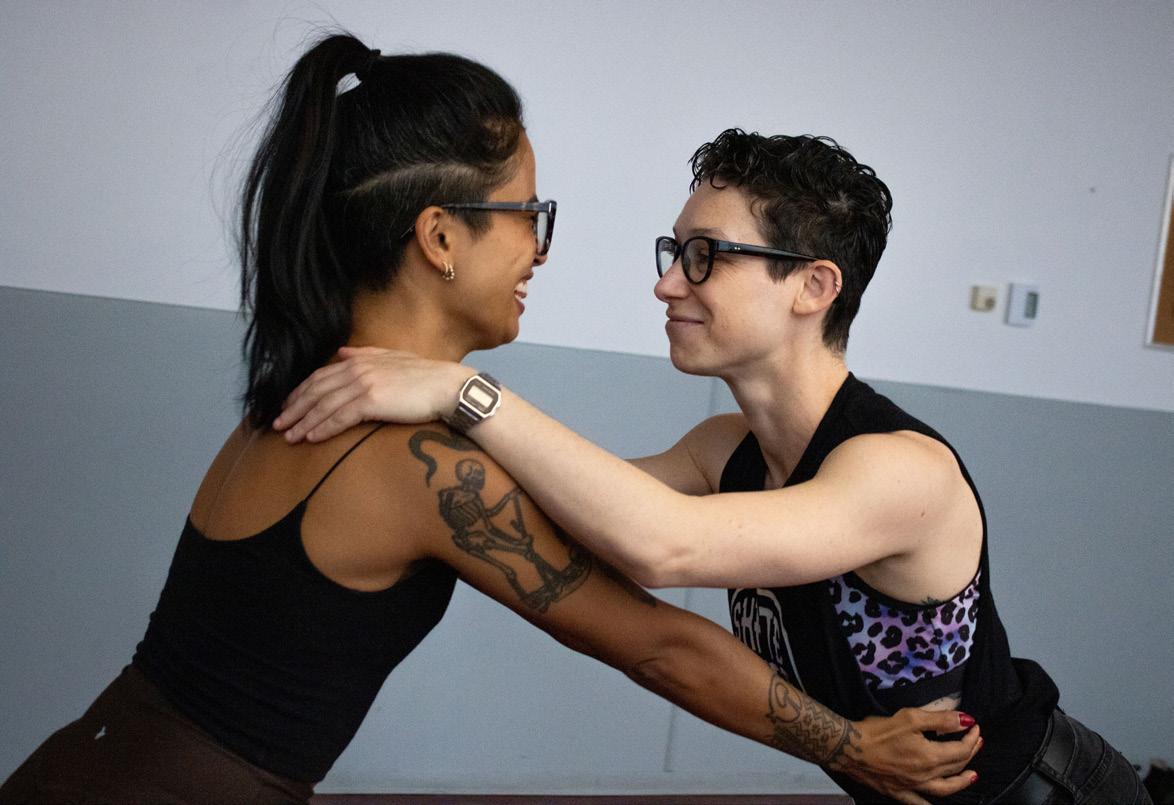
including winning the World Freestyle Slalom Championship four times. She rode the wave as the practice popularized. Throughout her award-winning career, Kozmic has dominated freestyle slalom skating, roller derby and roller dance.
Having taken a break from skating when she immigrated to Montreal in 2016, Kozmic started
skating again as a way to pass time during the COVID-19 pandemic. She grew her pandemic skating classes from a park to a school. Soon after, she met Rider.
Born in the Philippines and growing up in Calgary, Rider spent most of her childhood dancing. She even spent some time touring with the Young Can-
“It’s our duty as queer people who exist today to pay homage to those legends and elders who paved the way for us and who didn’t get to live out loud like we do.”
Joy Rider
taining way to pass the time.
Kozmic Joy first started creating together in 2022 for a friend’s album release party. The duo saw it as a way to rewrite history by telling the stories that have been kept secret.
“It’s our duty as queer people who exist today to pay homage to those legends and elders who paved the way for us and who didn’t get to live out loud like we do,” said Rider. “With everything going on culturally, and how queer artists are being ostracized again, I think that these stories are even more important.”
Their debut and only public piece, to date, Mad About the Girl, explores a queer love story during Hollywood in the 1950s that reflects the couple’s own history. The performance follows two characters, inspired by Fred Astaire—if Fred were a woman— and Ginger Rogers, who choose to act on their then-socially forbidden love. Taking inspiration

from the glitz and glam of the period, Rider and Kozmic decided to rewrite history.
adians of the Calgary Stampede. Feeling the pressure to choose a more conventional career path, she went on to study visual arts and arts education.
Rider moved to Montreal in 2018 to continue her studies at Concordia University in art therapy. To combat the loneliness of a new city, she reunited with her
dance background, adding an adult twist and took up burlesque. Since then, she has performed on many stages and won the 2020 Burlesque Hall of Fame Award for Best Debut Solo for her piece integrating traditional Filipino dance with burlesque through a decolonization lens. During the pandemic, she took up roller skating as an enter-
“I’m a cheesy romantic. There’s a meme: I love you in every lifetime, in every timeline,” Rider said. “We’re just lesbians across time. How do we create those stories that weren’t documented?”
The intensity and tension on stage grow more and more as Rider and Kozmic push and pull from each other, never seeming to grab on, but without ever fully letting go.
“I think the connection we have is a big component of the success of our collaboration be-
FRINGE ARTS 10 FRINGE ARTS • April 2, 2024 thelinknewspaper.ca
KOZMIC SKATER (ON THE LEFT), JOY RIDER, (ON THE RIGHT). PHOTO LANA BRADY
THE DUO CURATES DANCE ROUTINES DEDICATED TO SHOW QUEER HISTORY. PHOTO LANA BRADY
CHLOÉ SEYRÈS, A.K.A KOZMIC SKATER. PHOTO LANA BRADY
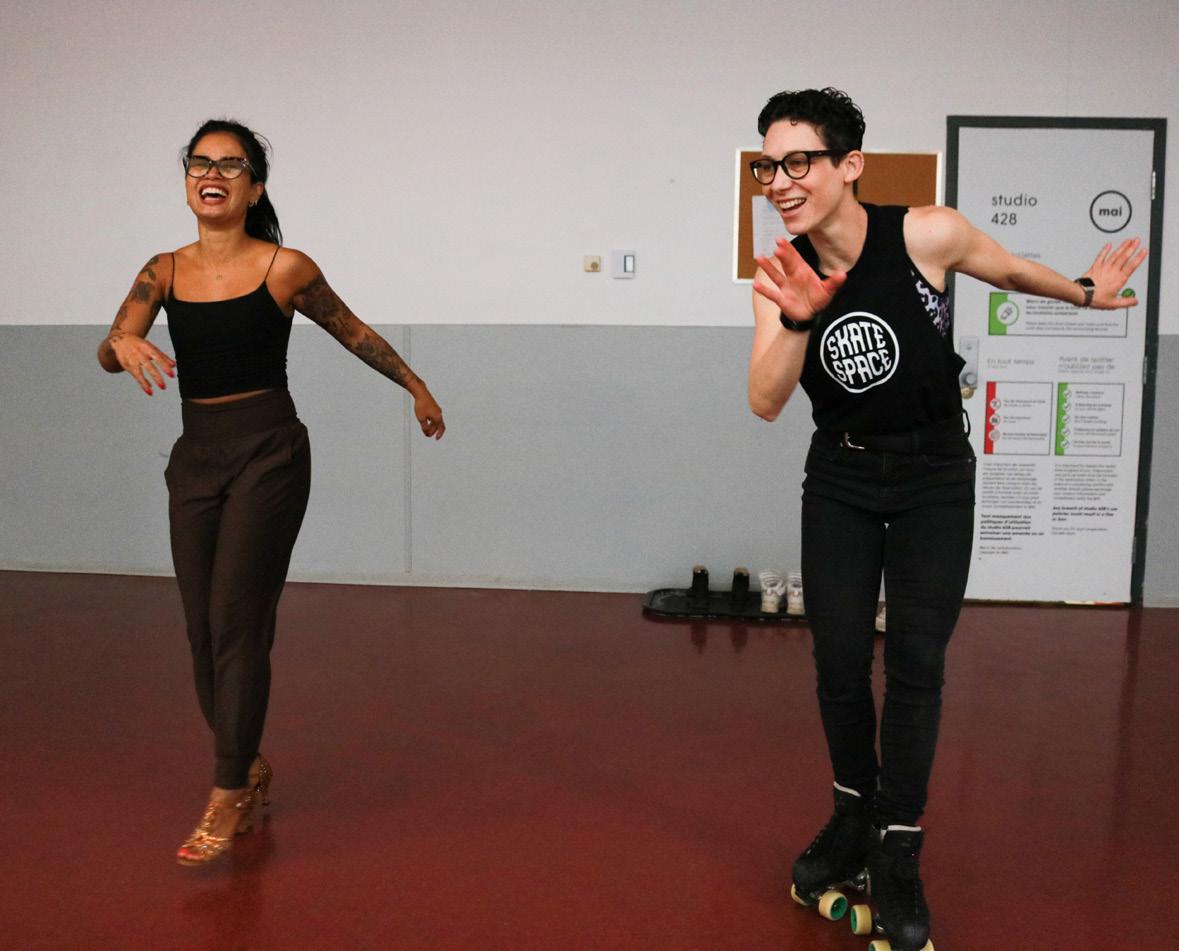
"The connection we have is a big component of the success of our collaboration because it’s raw and it’s true."
Kozmic Skater
climax. The pasties! The glitter! The boobs!” said Rider. “The goal is to sustain the tension and captivate the audience the entire time.”
Though some spectators would assume the mixing of burlesque and roller skating is the duo’s most integral element, Rider and Kozmic say their storytelling is what makes them who they are.
The narrative they construct is what pulls their audience in as they feel the heartbreak, the difficulty, the joy and, of course, the sexual tension.
“You see that a choice is made, and then we run into each other and towards each other. Then, the sparks fly. There’s something very magical and very special that comes to life,” Rider said.
Currently, the duo is working on a new piece that keeps the same characters, but time-travels back to the 1920s to the Prohibi-
tion flapper era. According to Kozmic Joy, they wish to create more pieces that challenge the historical queer narratives by rewriting their love story through time.
“They’re trying to bridge that mold of what is quintessentially seen as neo-burlesque, and really shaping it to be more contemporary and to be openly accepted by others,” said Nicole Lee, the artistic engagement coordinator at the MAI, who worked closely with Kozmic Joy during their residency in the Alliance Program, an artist support program.
The duo will perform this year at the Burlesque Hall of Fame in Las Vegas as returning winners and have plans to perform at the opening night of Toronto Pride later this June.
Though Kozmic Joy has accumulated a strong fan base and success in their young partnership,
Rider and Kozmic plan on keeping their solo careers and their day jobs. “We both have this Clark Kent Superman thing going where we put on our glasses and get to be our nerdy introverted selves in our day-to-day lives. Then, you put on the makeup and put on the persona and get this glamorous life on stage,” Rider said.
cause it’s raw and it’s true. People see it and feel it,” said Kozmic. “We don’t have to act. We don’t have to fabricate it.”
Mad About a Girl incorporates subtle historical elements, from their old Hollywood costumes, hand-made by Rider, to their modernized 1950s dance moves, such as swing and jive.
“We try to reference [in our movements] the era we are trying to illustrate, but we still keep our
Ashes
flare, our touch and our feel into it. The idea is not to copy-paste. It’s more to find the influence in the era and then twist it to make it ours,” Kozmic explained.
Through the occasional cheeky look to the crowd, or some teasing, their piece merges the intensity of an impossible love story with the satirical humour of classic burlesque, building the audience’s anticipation for the big moment.
“Bringing them to that point of
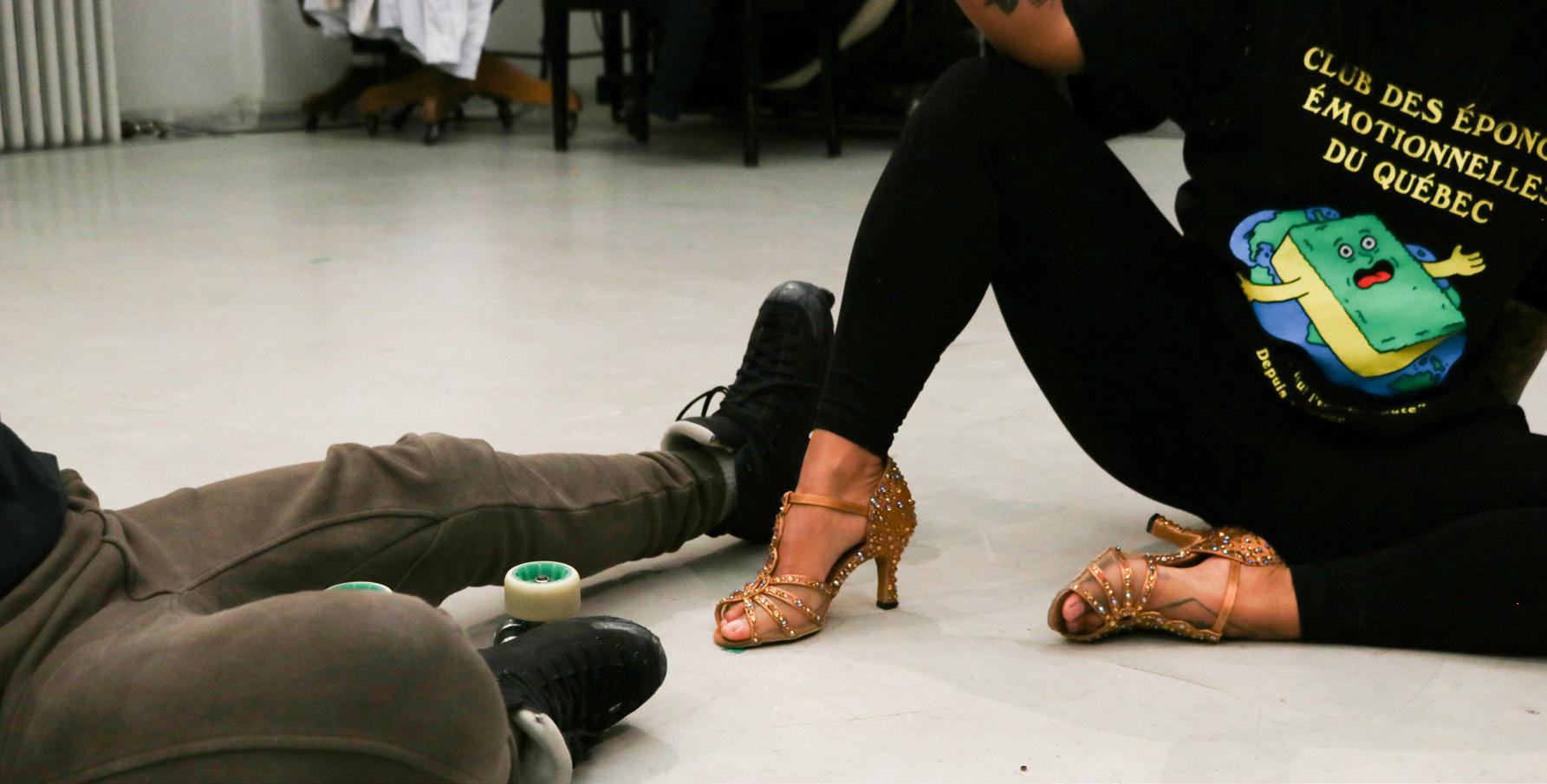

Gabrielle Laperrière Leblanc @gabouts
Le Charbon a fini de brûler

T’aimes bien quand je te parle en francais
Un goût de citron reste sur nos lèvres
Trois nuits de suite j'espère que tu vas pas te lasser
Ah, t’aurais envie de rester?
Ici
Jusqu'à demain encore
You make it hard to leave in the morning
The lazy kisses I could do them all day
Your lips seemed to have been made for mine
Why else do they fit so perfectly?
Why is my body melting into yours every time we lie down
Like magnets
Is this perfect timing or an awful one?
Only time will tell
FRINGE ARTS April 2, 2024 • FRINGE ARTS 11 thelinknewspaper.ca
ON WHEELS OR ON HEALS HOURS OF PRACTICE GOES INTO EACH PERFORMANCE. PHOTO LANA BRADY
MARBELLA CARLOS (RIGHT) CHLOÉ SEYRÈS (LEFT) PHOTO LANA BRADY
COURTESY LEON KOHLE
AFL Quebec introduces Australian football to Quebecers

The organization creates a welcoming environment for new and experienced players
As soon as they arrive for their weekly practice, Australian Football League (AFL) Quebec players greet each other and spark conversations. Some have known one another for years, and others are completely new to the sport.
Everyone gathers before heading into practice drills, where the newcomers are encouraged to introduce themselves. Although initially nervous about participating, they still feel accepted by their fellow players.
Caroline Leduc, the director of the league, is proud to be part of such a welcoming program.
“Our organization has always been very inclusive and supportive, regardless of a player’s athletic, physical or other abilities,” said Leduc. “We have members from various socioeconomic, racial, and ethnic backgrounds as well as many members from the LGBTQIA2S+ community, with disabilities, or who have different maternal languages.”
Leduc’s best friend introduced her to Australian football, and she fell in love with the league’s sense of community. Leduc played college basketball, where there was always pressure to be the best, so she was taken aback by how everyone in AFL Quebec accepted each other regardless of their skill level.
Australian football is a contact sport played between two teams of 18 players on an oval field twice the size of an NFL field. Originating from Melbourne in the mid-19th century, the roots of the sport are planted in early forms of rugby and Gaelic football, but it is uniquely Australian.
Australian football is played with a ball similar to a rugby ball but longer and more rounded. Games last 80 minutes, split into
four quarters of 20 minutes each.
Two sets of posts indicate the scoring areas at either end of the field. Players can either get six points for a goal when the ball travels between the inner set of posts, or one point for a behind when the ball is sent between the outermost set of posts.
The ball can be propelled in any direction through a kick or a clenched fish, called a handball or a handpass. When in possession of the ball, players must either bounce or touch it on the ground at least once every 15 metres while they run with it.
AFL Quebec is a nine-a-side football league—meaning nine players are on both sides of the field—founded in 2008 to capitalize on the popularity of Australian football in Montréal.
The league has representative men’s and women’s 18-a-side teams, the Quebec Saints and Montreal Angels. These teams compete against other representative teams across Canada and the United States.
The league also has a men’s and women’s division, which comprises teams from Montréal and its surrounding areas.
The regular season generally runs from May until early September, followed by a series of finals that last until late September. The preseason runs from February until April, consisting of training sessions and games.
AFL Quebec prides itself on focusing on inclusiveness and accessibility.
“We do everything possible to keep participation costs to a minimum,” said Leduc. “We are also helping with the integration and social support of newcomers in Montreal. We have many newcomer players, primarily from Australia but also
from elsewhere, who have recently moved to Montreal and join us in an effort to make connections and grow a community in their new home.”
Morgan Whyte, the president of the league, was born in Canada but grew up in Australia. He enjoyed AFL Quebec from the first training session he attended.
“I don’t really have any other friends outside of [AFL Quebec],” said Whyte, chuckling. “You come in, and you get into a position where everyone is so nice and so welcoming… When I’m thinking about what I’m going to do on the weekend, I think about my footy friends first.”
AFL Quebec is partners with Équipe Montréal, an organization bringing together LGBTQIA2S+ sports clubs and their allies in the greater Montreal region. They participate each year in the Montreal Pride Parade and the Community Day that takes place the day before.
AFL Quebec also won the 2022 Équipe Montréal Event of the Year for their 2022 Pride Round. The Pride Round is an annual event held by AFL Québec that includes Australian football sessions, games and other activities. This year, it will be held on June 9 at Collège André-Grasset.
But AFL’s diversity goes beyond Pride.
“I like the diversity because [all players are] not the same shape, but we all have our place on the pitch,” said David Marra-Hurtubise, a league member and board member. “There’s a big mix of personalities and every origin, too.”
Marra-Hurtubise learned about Australian football from his Australian brother-in-law. He had played soccer for the last 25 years,
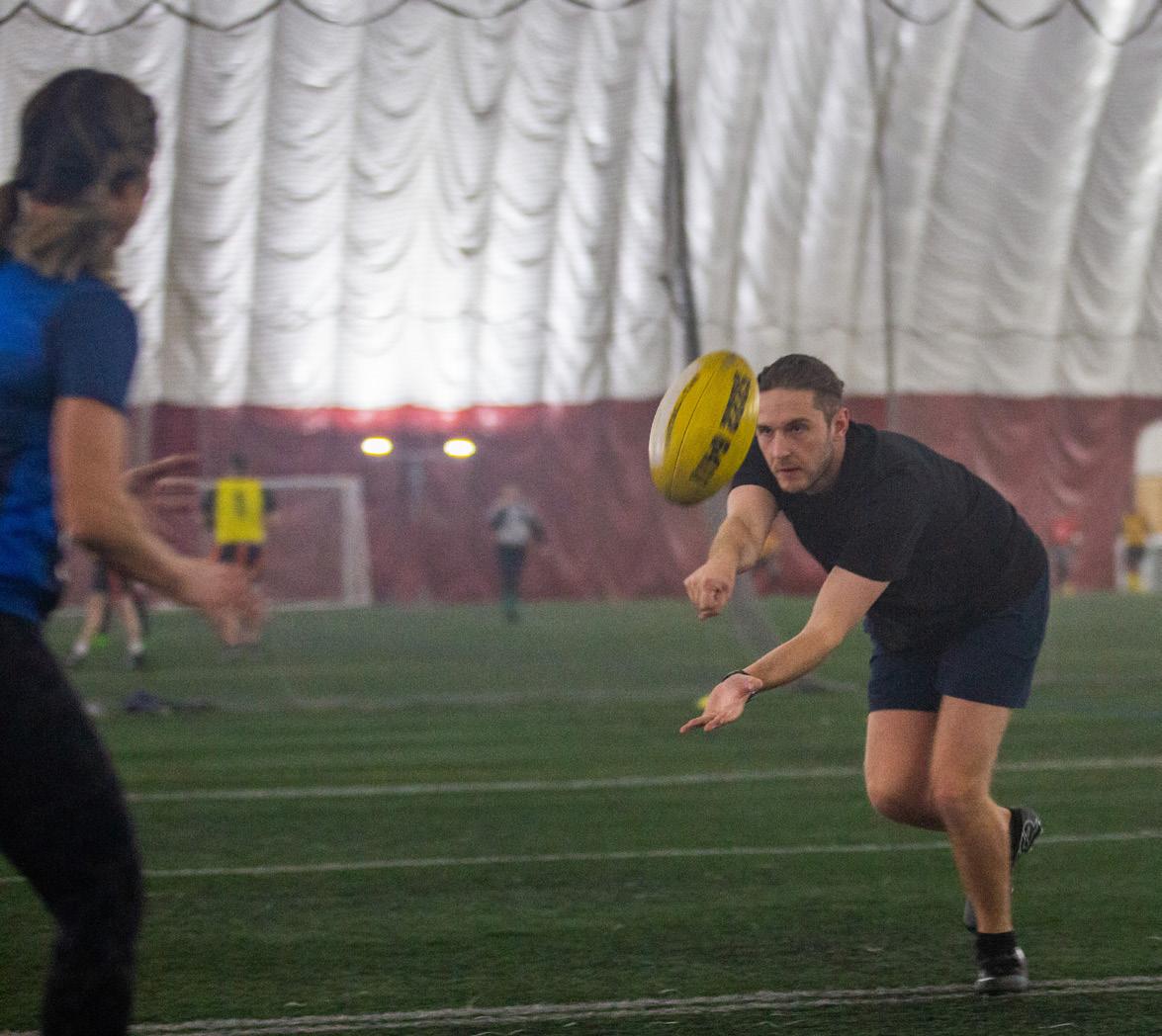
but he now loves getting to play with both his hands and feet.
Similar to Marra-Hurtubise, most AFL Quebec players said they found the sport through friends and family, but Carmela Jerry discovered the game about a year ago on Reddit.
Jerry loves the positive attitude everyone has, whether they are experienced or new players. Although she knew nothing about the sport, she liked how she could join even though she had no knowledge of it.
“You don’t have to even know the rules of the game before you join, so that’s been super great,” Jerry said.
Newcomers can join any sessions, even in tournaments like the Pony Platter.
The Pony Platter has been the traditional pre-season kick-off tournament since 2012. Hosted by the Ottawa Swans, it is held at the Manotick Polo Ground.
“I wasn’t there when the tournament started, but I heard some players went to a thrift shop and found a plate with some engraved horses on it, so they called [the plate] the Pony Platter,” said Leduc. “Since then, the women also started playing as well, and we bought a small red statue of horses.”
The Québec Saints and other teams across Canada visit Ottawa each year for the anticipated tournament, an all-day event with multiple games of men’s and women’s Australian football throughout. This year, the 2024 Pony Platter is held on May 11.
“The Pony Platter is a very friendly game when you start the season,” said Leduc. “It’s always a great time and good for new players to experience the game for the first time.”
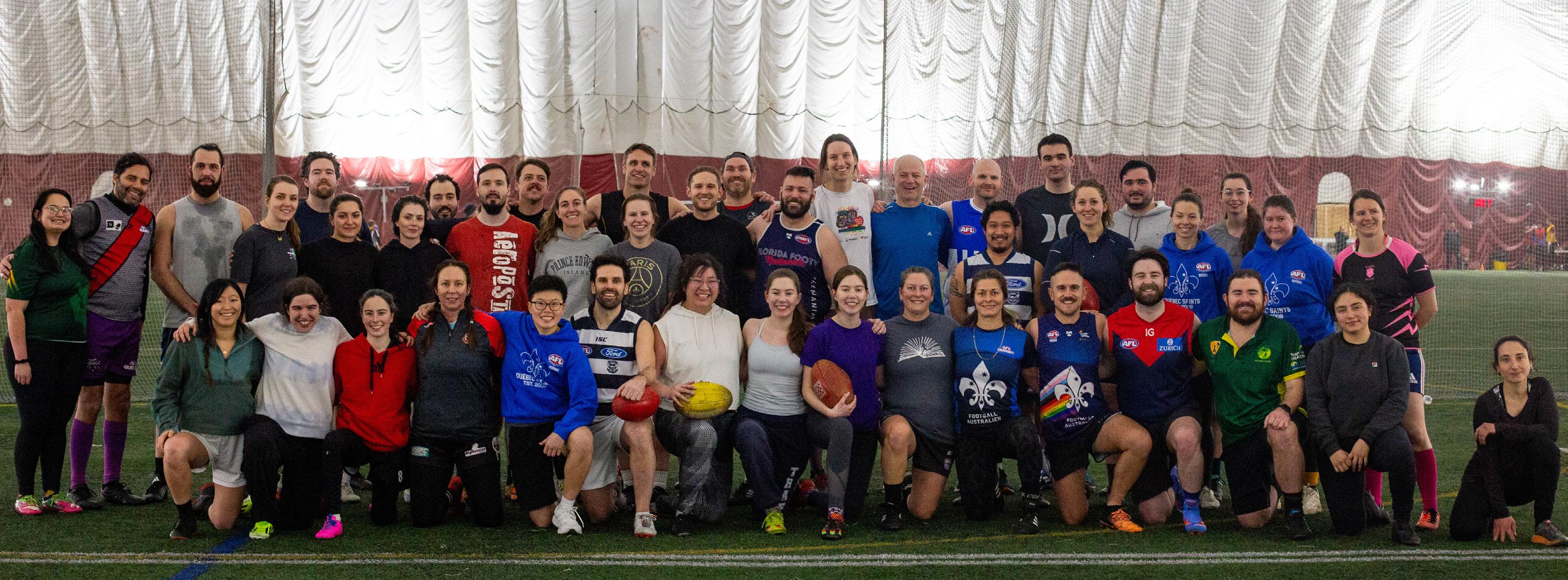
SPORTS 12 SPORTS • April 2, 2024 thelinknewspaper.ca
A PLAYER MAKES A HANDPASS DURING A PRACTICE DRILL. PHOTO ALICE MARTIN
Emily Douris-Blondin @emily.douris
THE WEEKLY SESSION’S GROUP OF PLAYERS POSE FOR A PICTURE. PHOTO ALICE MARTIN
No mountain too steep for Jessymaude Drapeau
Stingers forward rides past challenges to Nationals MVP

As the clock struck triple zeros in the ultimate Nationals clash at Merlis Belsher Place in Saskatoon, Sask., the Stingers poured off the bench and swarmed goaltender Jordyn Verbeek, marking their second U Sports title in three seasons.
Forward Jessymaude Drapeau, seconds removed from being named to the tournament all-star team, turned to teammate Léonie Philbert in shock at being announced as the tournament’s most valuable player.
Victorious gold around her neck and euphoric tears in her eyes, Drapeau greeted her parents on the ice. She turned to her mother, Karine Lizotte, and merely uttered: “Now it’s all good.”
Drapeau is one of many current Stingers who also experienced the gut-wrenching loss in the 2023 U Sports gold medal game in their home city. It remained fresh in Drapeau’s mind throughout this entire season, so much so that she prohibited her family from mentioning Nationals at all.
“After Christmas [this year], we were telling her that things were going well and that they could maybe go all the way,” Lizotte recalled, “and she said, ‘Don’t talk to me about that.’”
For Drapeau, the goal of this season became clear: work even harder.
“Every time I went to train, I reminded myself of the 1.8 seconds [on the clock],” she said.
She is no stranger to using previous failures as motivation. Prior to the 2023 gold medal game, her biggest obstacle came in midget hockey, where she hoped to represent her home province in the National Women’s Under-18 Championships. She was invited to training camp, but was cut from Team Quebec three years in a row.
Each of the first two times she was cut, she was able to look forward to the next season, where she would be more experienced and have a better shot of making the provincial team. Despair set in after falling short in her third and final year of eligibility, knowing that was her last opportunity.
“I watched all my friends make the team, but I never did,” she said. “The last cut during my three years was definitely very hard.”
Adding insult to injury, Drummondville, Que.—the training camp site—felt like forever away from Drapeau’s hometown of Rivière-du-Loup, Que. Having to bear such a heavy burden alone, far
from family would be too much for any athlete, let alone a 17-year-old.
For Lizotte, there was no doubt that it was the toughest moment for Drapeau up to that point in her career.
“As a parent, what can you say other than ‘This is the life?’” she said.
But Drapeau, ever-determined, knew that she could use this tough experience to her advantage.
“I was always fueled by it. I love failures,” she said, chuckling. “Getting cut was always hard, but I think that if I didn’t go through that in that moment, I wouldn’t be where I am right now, so I’m a bit thankful for getting cut because my career is going really great right now.”
That career entered its current chapter four years ago, when Drapeau arrived at Concordia. The pedigree of the Stingers coaching staff combined with her desire to study in English made the commitment a no-brainer.
Her would-be rookie season was canceled due to the COVID-19 pandemic. She saw success immediately as a rookie in 2021-22, being placed on the top line with star forwards Emmy Fecteau and Rosalie Bégin-Cyr.
“I looked at them as idols,” Drapeau said. “They had already
accomplished so much, so I was shocked at being able to play with them. They’re incredible.”
Drapeau was nothing short of incredible herself, putting up 12 points in the COVID-shortened 15-game regular season. She added seven points in four provincial playoff games and helped the Stingers to their first U Sports title in 23 years.
Her third season was marked with extra responsibilities with the ‘A’ being added to her jersey, making her an alternate captain. Drapeau, who is usually shy and reserved, had risen to the occasion and had previously proven that she could handle a leadership role, to the delight of her coaches.
“Last year, just before playoffs, we had a team meeting,” recalled head coach Julie Chu, “and she stood up and said some words, and I think everyone in the room was like, ‘Oh my goodness, that was great!’ That was a really proud moment for me,” she said with a smile.
Chu has seen Drapeau transform from an isolated player too shy to speak in front of a group to a confident leader who looks people in the eye and has no problem maintaining a conversation.
Drapeau’s motivational tactics have rubbed off on her teammates, even those who already have letters on their jerseys.
“She encouraged me to develop good habits, good routines,” said captain Emmy Fecteau. “She pushes me to improve. She often sends me quotes to motivate me, which I really love.”
Drapeau’s transformation has been apparent on the ice, too. Not only is she comfortable in high-pressure moments, they bring out the best in her.
Jared Lackman-Mincoff

@jared_lm02
In the 2024 U Sports semifinals against the Waterloo Warriors, the Stingers were barely clinging to a 2-1 lead late in the third period. The Warriors were mounting the pressure, and got themselves a power play with under three minutes to play.
“I said to myself that this was the same scenario as last year,” Lizotte remarked. “But I knew somebody would wake up.”
With under 90 seconds to play, Drapeau, who had taken on penalty killing duties this season, poked the puck past a defender along the boards, and streaked in all alone on Warriors goaltender Mikayla Schnarr. A couple of stick handles later, Drapeau found twine, and wrapped a bow on a 3-1 victory for the Stingers.
With Fecteau and Bégin-Cyr leaving the team, there is no better way for Drapeau to show her teammates and coaches that they will still have a reliable veteran leader next season.
Lizotte has no doubt that she will be prepared for anything that comes next. “She has strength of character and determination. It makes her who she is today,” she said, wiping a prideful tear off her cheek.
Drapeau aspires to play professionally, but she will likely play out her final two years of U Sports eligibility before chasing a Professional Women’s Hockey League career.
For now, she is focused on the immediate future. Drapeau has never felt more ready to take the bull by the horns.
“With everything we’ve gone through, everything I’ve gone through, I think I’m ready for new challenges,” said Drapeau, confidently. “I’m excited to see what next season will bring me.”

SPORTS April 2, 2024 • SPORTS 13 thelinknewspaper.ca
JESSYMAUDE DRAPEAU CELEBRATES HER GOAL. COURTESY CONCORDIA ATHLETICS
JESSYMAUDE DRAPEAU GOES HEAD TO HEAD WITH VARSITY BLUES DEFENDER EMMA POTTER. COURTESY CONCORDIA ATHLETICS
Motionball Concordia event raises funds for Special Olympics
Marathon of Sport brings Special Olympics athletes together with community
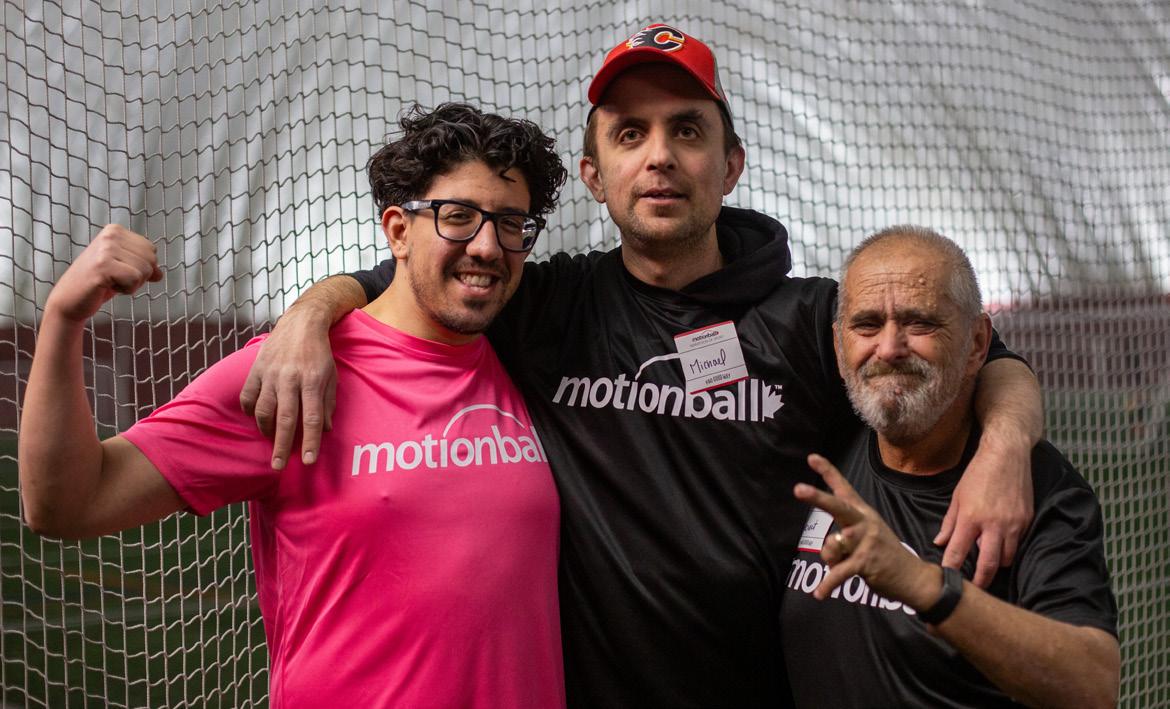
Special Olympics athletes and participants of Motionball Concordia’s Marathon of Sport took the field at the Stingers Dome on March 30 to raise funds for Special Olympics Quebec and Special Olympics Canada.
During this year’s iteration of the Marathon of Sport, Motionball Concordia raised $4,500, despite their goal of $10,000.
Shelley Craig, the mother of Leo Soudin, explained how important the funds were to athletes like her son. Soudin, who was present at the event, has been a Special Olympics athlete for 12 years and started out doing downhill ski racing.
“[Special Olympics Quebec] decided for downhill ski racing, that it was important that they had the
proper [helmet] because there's a certain specific helmet for racing,” said Craig. “And they decided that it was important to protect the athletes, so they would have these helmets, but they're very expensive. So they gave money towards it to purchase it.”
The evening of activities included bowling, spikeball, Q-tip hockey and soccer. Around a dozen Special Olympics athletes attended the event alongside participants and organizers.
Robert Lemieux and Michael Kuczynski are both Special Olympics athletes who are well accustomed to Motionball and have been attending the organization’s events around Montreal for a long time.
Lemieux, who plays mostly bowling and soccer, explained his favourite part of Motionball was the people. “The friendships, meeting new friends, meeting old friends. Motionball’s like a family to me,” he said.
Kuczynski, who plays floor hockey, softball and golf, has been going to Motionball events since
Potential policy change could harm U Sports men’s hockey
Analyzing the repercussions of allowing NCAA eligibility to CHL players
Alice Martin

2018 and has been involved with the Special Olympics since 2003. He echoed Lemieux’s sentiment, saying he loved “meeting new people, the activities, the whole nine yards.”
Anthony Colonna, who is the event director for Motionball Montreal and has become a good friend of Kuczynski through Motionball, admired Kuczynski’s love for the organization.
“Every year since I've been running [Motionball Montreal’s] Marathon of Sport, [Mike] knows our events are done in the morning. Our events usually start at 8:30 a.m. [and] Mike is there before I'm there—at 6 a.m.—to set up,” Colonna said.
Although many old faces were present, the Marathon of Sport still suffered an underwhelming turnout, according to event director Chelsea Morgan. She explained that the event taking place on Easter weekend was the main cause.
“It was just a little disappointing to not have the numbers that we typically do,” she said. “But
overall, we still have a good base of people that are very invested in what Motionball is, and keep up the key parts of it, which is integration, celebration and inclusion.”
Morgan, an athletic therapy student, still felt happy with the event, especially considering other athletic therapy students had joined to help out in the Marathon of Sport.
“We know the importance of being active and the joys that playing in sports bring,” said Morgan, when asked about the large proportion of athletic therapy students. “We understand how sports brings people together.”
Motionball events happen all over the province during the year. Motionball McGill is set to hold their own version of the Marathon of Sport on April 7 and the larger Motionball Montreal event is held annually in September.

USports men’s hockey could have a major obstacle coming its way.
Hockey writers have begun wondering about the National Collegiate Athletic Association (NCAA)—which governs varsity athletics in the United States— possibly changing its amateurism policy to allow eligibility to junior hockey players from the Canadian Hockey League (CHL).
The NHL’s agreement with the CHL forces NHL teams to send their prospects back to their CHL teams if they are not yet ready for the NHL. Therefore, the junior level is filled with top NHL prospects already signed to their entry-level contracts.
CHL players receive stipends for their services, and go toe-totoe with players already under professional contracts, deeming

Jared Lackman-Mincoff @jared_lm02
the entire league professional by NCAA standards. As such, players relinquish NCAA eligibility by playing a single CHL game.
Sportsnet’s Elliotte Friedman said in February, “We are headed towards a future of where CHL players are going to be able to play NCAA hockey. The question is when.”
CHL players that don’t make it to the NHL or another professional league often turn to U Sports hockey to continue playing hockey while pursuing higher education.
As a result, former CHL players make up the majority of U Sports men’s hockey rosters. Twenty-one out of the 25 members on the Concordia Stingers men’s hockey team previously played in the CHL.
“[The current policy] kind of protected us a little from losing talent
down to the U.S. colleges,” said Concordia Athletics Director D’Arcy Ryan.
However, the NCAA’s inception of the name, image and likeness (NIL) rules in 2021—which allows athletes to receive compensation for their personal branding—incited a shift in leniency regarding amateur versus professional status of athletes.
CHL players would be attracted to American colleges rather than Canadian universities should they have the choice, largely because of the discrepancy in allowable scholarships.
Ryan explained that U Sports only allows scholarships to cover tuition and other compulsory academic fees, meaning that Canadian universities cannot offer much money to entice an athlete.
“Whereas in the States, making living accommodations, room, board, all that would be covered. We can't compete with that,” he said.
However, an NCAA policy change is not as simple as it may seem. The earliest the policy could be discussed is in April at the annual college hockey coaches conference. By that time, the U Sports men’s hockey recruitment cycle for 202425 will have mostly run its course.
Adam Wodon, reporter for College Hockey News, is skeptical that any adjustments will be made.
“I think there's a misconception going on in Canada or maybe among hockey writers that this is a big issue for the NCAA. It's really not. No one's even thinking about it, other than college hockey coaches,” he said. “I think a lot
of that was based on speculation.”
It would also take some time yet for the policy to be changed. The decision would need to go through several different committees within the NCAA for approval and execution, according to Jim Connelly of United States College Hockey Online.
“This is something that we're gonna talk about in April. We might vote on it in June, and then next December there'll be a conference where somebody else will hear it and they'll vote on it,” he said, adding that NCAA operations mimic parliamentary order.
U Sports declined The Link’s interview request and indicated that it has “no comment to make about media reports on a potential coaches association vote in the United States.”
SPORTS 14 SPORTS • April 2, 2024 thelinknewspaper.ca
@_alcmrtn
STINGERS CENTRE GABRIEL PROULX, FACES OFF AGAINST A GEE-GEES PLAYER. BOTH ARE FORMERLY FROM THE QMJHL. PHOTO ALICE MARTIN
LEFT TO RIGHT: ANTHONY COLONNA, MICHAEL KUCZYNSKI AND ROBERT LEMIEUX POSE FOR THE PICTURE. PHOTO ALICE MARTIN
Breaking the chains
Women's struggle against capitalism's hold within family structures
In the Western world, discussions around family abolition often intersect with broader conversations about social justice, feminism, queer and anti-capitalist theory.
Our family dynamics, the roles and relationships between family members, and the factors that influence how they interact have changed over time. This is based on historical and material shifts in social organization of communities.
A perfect illustration of this is how the family structure of serfs during feudal times transformed alongside their social and economic status with the emergence of capitalism. Women have been under the stranglehold of capitalism ever since its emergence.
With the rise of capitalism came the conventional perspective that the household is a natural reproduction of life and is thus the most essential form of production. Exploiting the working class became the perfect opportunity to create an exploitable labouring population.
This goes hand in hand with the way the economy was run in the 20th century, when the welfare state reinforced the role of the family as the basic unit for societal reproduction. The nuclear family was obedient and productive, forced to maintain stability and productivity in society.
This traditional nuclear family structure reinforces heteronormativity: a husband and a wife and their children, playing a crucial role in reinforcing gender norms and inequalities within society. The family was led by the breadwinning father, with the mother raising typically two children who all played subordinate roles of the household patriarch.
The exploitation of women played a central function in the process of capitalist accumulation, as women have been the producers and reproducers of the most essential capitalist commodity: labour-power.
Labour-power is the ability of workers to do work and create stuff, like goods or services. Think of it as what workers offer to their bosses to get paid.
It's not about the work they've already done, but their potential to work. It's what makes employers pay you wages because you can work. The value of this ability is tied to what's needed to live a basic life,
such as food, clothing and housing.
Through a Marxist feminist lens, the woman in the household and in society is used as a form of unpaid labour, allowing the economy to operate. She reproduces labour power by providing food to male workers as well as providing the next generation of workers from their wombs.
Women’s unpaid labour in the home has been the pillar upon which the exploitation of the waged worker has been built and the secret of its productivity.
However, family structures are adapting once again under the decay of late-stage capitalism and a slow deviation from patriarchal structures.
The deconstruction of traditional family models is linked to class liberation.
Under neoliberalism, markets are so heavily de-regulated and nation-states refuse to provide services and regulations to stop socio-economic instability. This makes it difficult for traditional households
to survive. Late-stage capitalism is a time of dominance by multinational companies, growth in the global circulation of capital, and an increase in corporate profits and the wealth of the richest members of our class-based society.
Everything becomes commodified and consumable. There is an emphasis on productivity and economic competitiveness, which can create challenges for individuals balancing work and family responsibilities, including caregiving and parenting by women.
The role of the woman under capitalism today is much more socially complex. While equality among women and men has improved significantly, there are many underlying social limitations that hinder the well-being of the woman as an individual within society. These limitations have a lot to do with the family.
Black American activist Angela Davis discusses the double burden that women experience.
They now have to juggle both career and domestic responsibilities, which creates an exceedingly difficult way to achieve an equitable work-life balance.
As child-bearers, women are usually the ones who carry the burden of child-care at home during the early stages of a kid’s upbringing. This makes it hard to meet ambitious career goals.
This unpaid care work is essential for the functioning of society and the economy, but is often undervalued and unrecognized. The unequal distribution of care responsibilities reinforces gender roles and inequalities.
The abolition of traditional family structures goes hand in hand with radical feminism and class liberation. Abolishing the family institution challenges patriarchal power structures, gender roles and social inequalities perpetuated within familial units.
Feminist family abolitionism can stand against the naturalization of traditional family roles and dis-

mantle harmful norms such as gendered expectations. By continuing to restructure and find innovative ways to challenge the privatization of caregiving responsibilities and promote collective approaches to social reproduction, we can attain the goal of true class liberation.
The role of women under capitalism has always been of foundational importance in the strength of its system. It started by rooting the women’s place within the nuclear family. Despite the movement of women’s rights, women still have a double burden over their shoulders.
We must keep pushing for a restructuring of the family dynamic that resonates with a shift from patriarchy and the economy’s ever increasing severity.
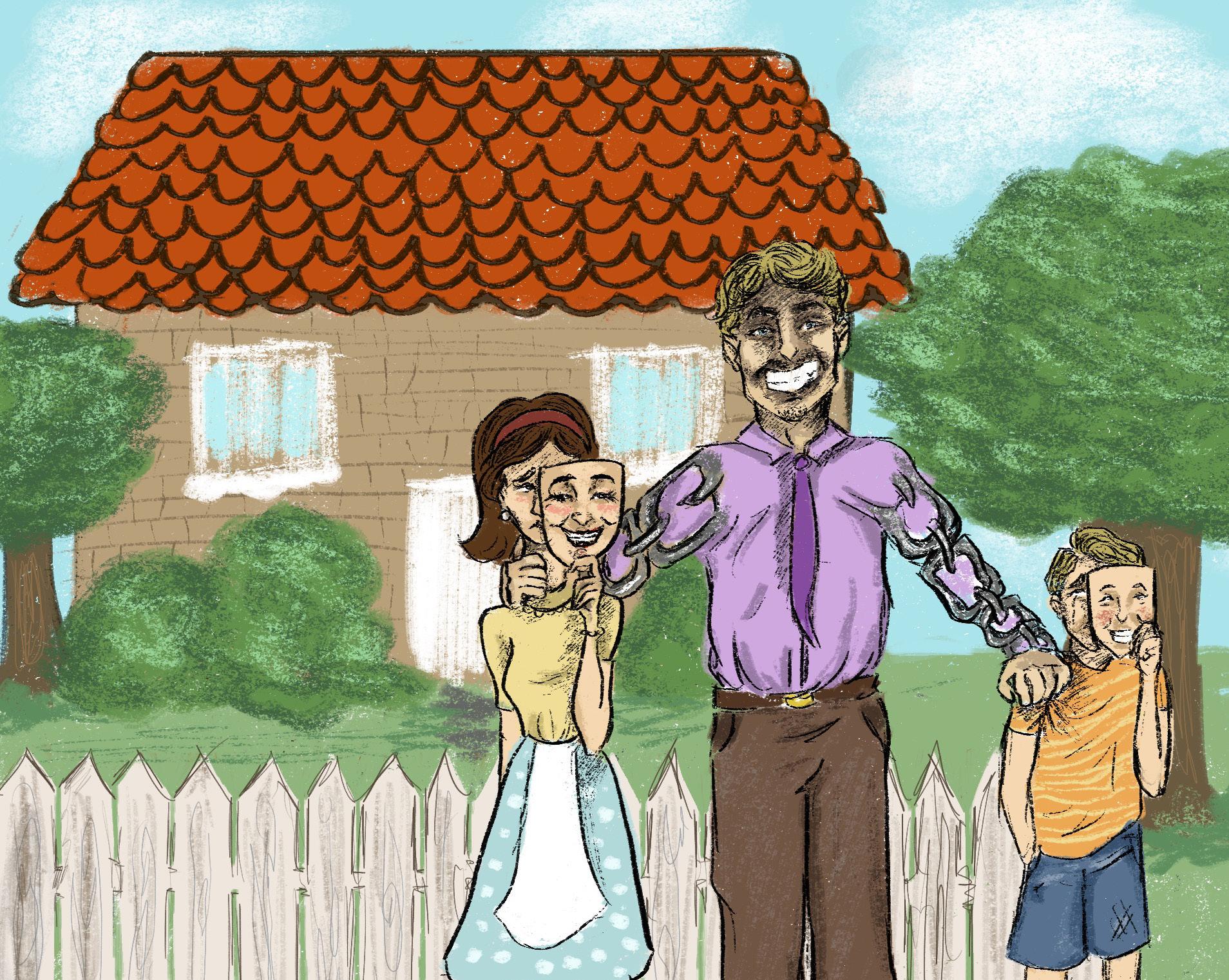
OPINIONS April 2, 2024 • OPINIONS 15 thelinknewspaper.ca
Julia Cieri @_juliacieri
GRAPHIC MYRIAM OUAZZANI
Sex Ed(itorial): Fluent in Fluidity
Evolutionary insight into female sexuality
Before studying evolutionary psychology, I believed that people who claim women are more sexually fluid than men held one of three reasons.
These reasons were: women wanting to feel a part of the norm; men wanting to normalise their expectations of threesomes with two women, but not with another man; or women wanting to express their attraction to other women without facing the societal repercussions of coming out as gay.
Indeed any of these may be true, and it is true that many feminist and gender scholars view gender and sexual orientation as social constructs. However, it is also true that empirical science provides contrasting evidence.
“Pure social constructivism is... deeply problematic,” writes psychology professor Dr. Lisa Diamond in Sexual Fluidity: Understanding Women’s Love and Desire
“As a feminist, I champion its emphasis on the social, political, and cultural factors that structure women’s experiences. Yet as a psychologist interested in the links between mind and body, I am frustrated by the fact that pure social constructionism discounts the role of bodies and biological processes in sexual experience,” she writes.
Like Diamond, I view sexual feelings and experiences as influenced by both the society around us and our biology, and that research in this area should combine the two perspectives.
Perhaps sexual fluidity in women is a conditional adaptation, like how our skin forms calluses in rough conditions but stays smooth in gentler environments—allowing for heterosexual behaviour in specific circumstances and homosexual behaviour in others.
Recent literature reflects growing recognition that male and female homosexuality may have different evolutionary origins, and the diverse forms of non-heterosexuality in women may result from specific evolutionary and developmental processes.
As defined by Diamond, sexual fluidity encompasses the range of stimuli and circumstances that evoke a sexual response in an individual.
Eye-tracking studies indicate that men often quickly focus their attention on nude images of their preferred sex, immediately identi-
fying these images as sexual.
On the other hand, women exhibit attention towards these images related to both preferred and non-preferred sexes, perceiving both categories as sexual. In fact, most women who identify as heterosexual experience genital arousal when exposed to erotic imagery of other women.
Put simply, women exhibit greater sexual fluidity than men.
Evolutionary theorists face the task of demonstrating why a significant proportion of women experience attractions toward
India Das-Brown @india.db

In the case of an absent or unreliable father, the child’s survival is compromised due to lesser support, and it may be beneficial for their mother to form a close relationship with another woman as opposed to raising her child alone.
Infanticide occurs frequently in nonhuman animals, as well as in humans, where a stepfather is 120 times more likely to commit infanticide than a biological father.
Knowing this, it is fair to argue that being incarcerated isn't what leads inmates to identify as non-heterosexual. Rather, a unique blend of biological, psychological, and social factors might be linked to natural reproductive and life strategies in non-heterosexual women.
where child mortality is low.
Evidence from Italian and Australian studies indicate that non-heterosexual women indeed tend to have lower reproductive success compared to their heterosexual counterparts. However, the Italian study found this disadvantage can be balanced out by having more children over time.
GRAPHIC MIRA DE KOVEN
other women, and why these attractions may fluctuate over time within individuals.
Until around the age of 18, humans place the primary burden of their caloric expenses and development on their parents, with additional support coming from an ‘alloparenting’ network. This network includes extended family and community members who also contribute to their upbringing.
A woman with existing offspring would benefit from avoiding contact with other males who may commit infanticide in favour of relationships with other women, who are more likely to show a nurturing response toward her child.
These “fast life history strategies” are characterized by energetic resource prioritization toward mating and other risky behaviours, rather than towards maintenance or parenting.
It is important to note that

In Australia, almost 37 per cent of incarcerated women identified as lesbian or bisexual, versus four per cent in the population in 2019. However, the percentage of male inmates identifying as gay or bisexual, at 5.5 per cent, did not surpass the proportion of gay and bisexual men in the general population.
despite the potential costs of faster life history strategies, such as risk-taking, substance use, and poorer health outcomes, they might still make sense from an evolutionary point of view. This is because they can lead to reduced time between the birth of one child and the conception of the next child. This leads to more surviving offspring, especially in modern developed societies
It could also be that women are attracted to other women because there aren't strong evolutionary reasons against it. Factors like men placing low importance on intimacy and competing with other men for mates might also result in minimal pressure against genes that make women's sexual orientation flexible or changeable.
These evolutionary pressures have less effect with a fluid sexuality, but get stronger as someone leans more towards being exclusively attracted to the same sex. So, a pattern emerges where most women are mostly into the opposite sex, but a smaller group are only attracted to the same sex.
The topic of evolution and variance in human female-female sexual expression is complicated.
This is because of the lack of relevant terminology developed in many cultures and, by extension, because women having sex with women have been marginalized by historical perspectives that discredit female sexual diversity.
Here, the importance of understanding the evolutionary origins and implications of human female sexual fluidity becomes clear.
“For those of us who question, your whole life becomes a question,” writes Diamond. “Do you then reach some level of understanding, and then it's static? I don't think so.”
OPINIONS 16 OPINIONS • April 2, 2024 thelinknewspaper.ca
Leave Black girls alone
The dangerous effects of adultification and hypersexualization on Black girls
At ten, puberty came knocking on my door like a hurricane, shaking up my world with its wild winds of change.
I was developing at an alarming pace compared to others. It was made clear from the beginning that this new body I was entering was a distraction.
This resulted in me being in constant battle with my body.
I perceived it as a burden. As I looked around the locker room, I could not help but compare my body to the other girls, always feeling a step further. I never dared to think about wearing a tank top, or a tight T-shirt.
By the time I got to high
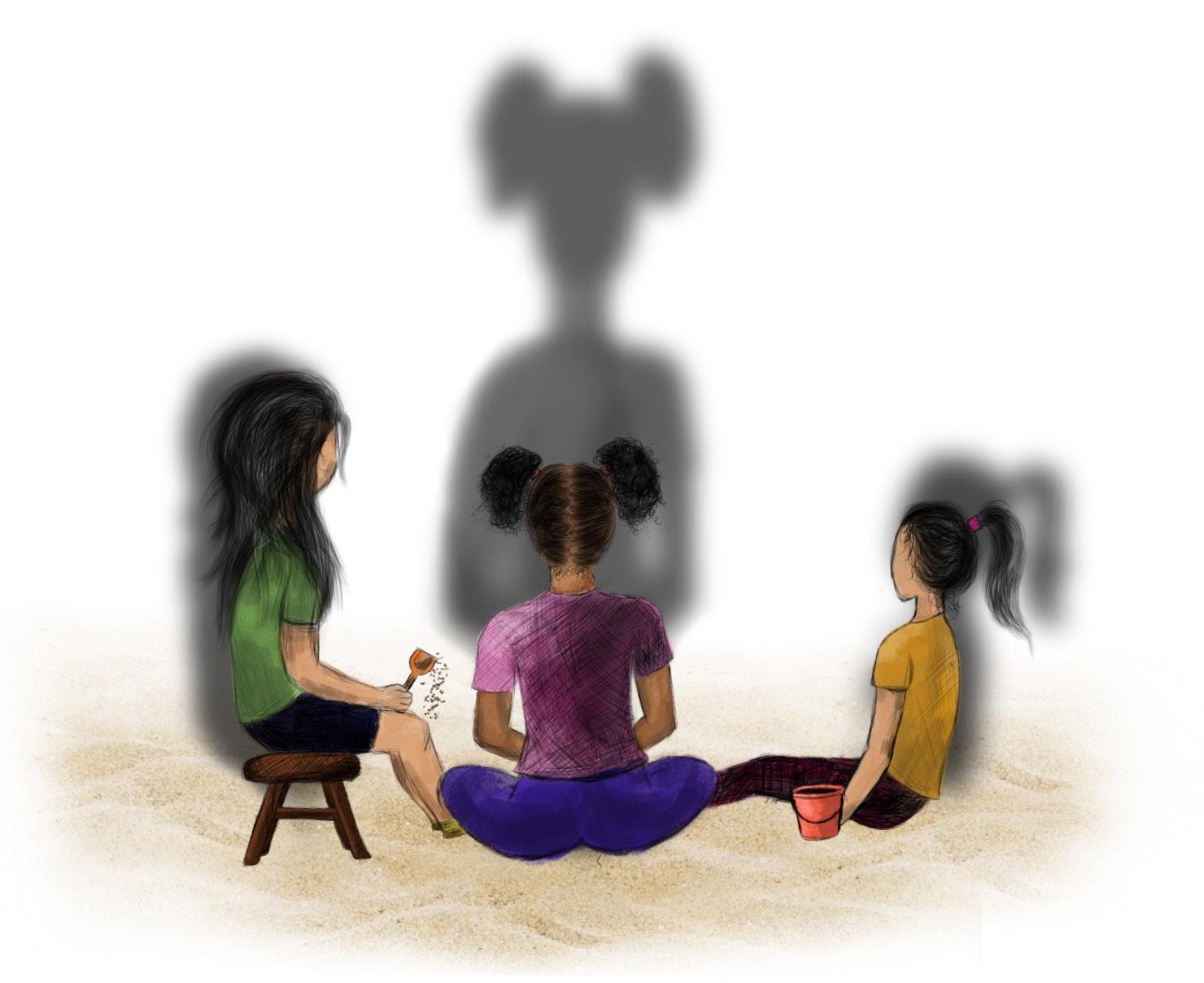
school, wearing an identical uniform, the difference was still striking. I had the mind of a teenager in a young woman’s body. On my journey to body neutrality and positivity, I have understood that my experience is the one of many young Black girls and women.
The adultification bias of Black women and girls is entangled in the premature perception of them as adults.
Adultification is a phenomenon in which Black girls are perceived as more mature than white girls. It robs young Black girls of their childhood, pushing them into a stage of their lives for which they are unprepared.
In a study, a majority of the participants from diverse backgrounds perceived Black girls between the ages of five and 14 as more mature.
Adultification leads to many disadvantages for these girls, such as mistreatment to missing simple experiences in finding their identity. This perception extends to viewing Black girls as needing less
Am I being a bad friend?
nurturing, protection, because they’re seen as more independent.
Adult survey participants perceived Black girls as knowing more about adult topics, including sex, implying their inherent sexualization.
This adultification of Black girls as sexualized beings contributes to their loss of innocence, affecting how they are treated in education and juvenile justice systems.
The sexual connotation often attributed to our bodies goes back to slavery.
During slavery, Black women were stereotyped into categories: the sapphire, the jezebel or the mammy.
The sapphire is seen as brute, loud and aggressive. In contrast, the mammy is nurturing, and selfless, with no sexual desire. Lastly, the jezebel is hypersexual, a seductress that will tempt and exploit men. The jezebel has created the perception of Black women being sexually promiscuous.
This is not only dehumanizing, but also hurtful. These stereotypes have had an exceptional impact on
High-maintenance friendships and the tendency toward toxicity
Society has set a standard about what a best friend should be. It typically includes qualities like trustworthiness, loyalty and mutual support.
Best friends are often expected to be there through thick and thin, to provide emotional support and to keep secrets. However, the exact definition can vary widely based on individual experiences, cultural backgrounds and personal preferences.
I have had the same friends since I was ten years old. We didn’t even go to the same high schools, yet not one of us has ever made another feel like we aren’t enough as friends.
Now at 20, I see my friends once or twice a month and we catch up on everything that has happened since the last time we spoke. We hardly text, we don’t call every day and we rarely have arguments, and that works for us.
Life moves so fast, especially as a student. For many people, it often feels like there's a continuous demand to stay connected, to always be available for calls, FaceTime or texts. But in reality, many of us are
juggling multiple responsibilities and simply don't have the time to be constantly in touch.
A difficult challenge that can arise in a friendship is the imbalance of effort in maintaining the relationship. One-sided friendships can be so emotionally draining. They can leave you feeling isolated and lonely, especially if you’re the one providing support but not receiving any in return.
It can feel like you're always the one who's putting in the work, while the other person takes a more passive role. Maybe they don't initiate contact, they don’t make plans or ignore your feelings and take you for granted. But as soon as there's a bit of distance that develops in the friendship, they’re quick to point the finger and criticize you for all the problems.
This can lead to feelings of frustration and resentment. You start to wonder, will they ever reach out if I don't? Is our friendship over?
Friendships can be especially draining when expectations are high. Those we consider friends often have unrealistic expecta-
tions of us; they expect constant availability and undying loyalty.
It’s important to recognize our own limits and boundaries in all relationships. Preserving a friendship should never come at our own expense, especially if it causes us nothing but pain. Not everyone can handle a high-maintenance friendship—I certainly can’t, and that’s perfectly okay. Prioritizing your needs before others is normal and it’s okay to say no to plans or take a step back when you need space.
Friendships shouldn’t be about constantly meeting unrealistic expectations. If a friend expects me to drop everything and always be available at a moment's notice, that's not realistic or fair. Friendships should be about mutual respect, understanding and support. I should be allowed to say no to plans without it resulting in an argument.
It’s okay to have different definitions of what makes a good friend. What works for one person may not work for another. It doesn’t mean you are a bad person, it just means you are not the version of a best friend the other

the perception of Black women today.
Hollywood has maintained the dehumanization of Black women by turning them into sexualized objects. A study on the media’s representation of Black women found that they are more likely to be depicted as partially or fully nude compared to white women, and they are twice as likely to be seen in revealing clothing on screen.
This continued cultural fetishization and hypersexualization of Black women further sexualizes Black girls in the process. This affects how Black girls are viewed and treated, contributing to their adultification.
I have experienced many instances of sexualization and adultification as a Black woman. I believe that the root of the problems lie in stereotypes being perpetuated. We need to criticize our school systems, but also hold our cultural institutions accountable for continually fetishizing Black women. Black girls deserve their childhood.
Emma Augello
person expects in order to meet their needs. If those needs are toxic, pushing them away is fine. Outgrowing people is a part of growing up and moving on. It's important to prioritize your mental and emotional well-being. If a friendship is causing you more stress than joy, it may be time to reevaluate the relationship. Take a step back, reassess your priorities, and focus on the friendships that truly bring positivity into your life.
A true friend supports you in every way possible, they’re by your side through thick and thin. Those qualities should not be overlooked just because they don’t call you enough.
Stop worrying about meeting other people's expectations and focus on the friendships that bring you happiness and fulfillment. Don't be afraid to let go of those that don't.
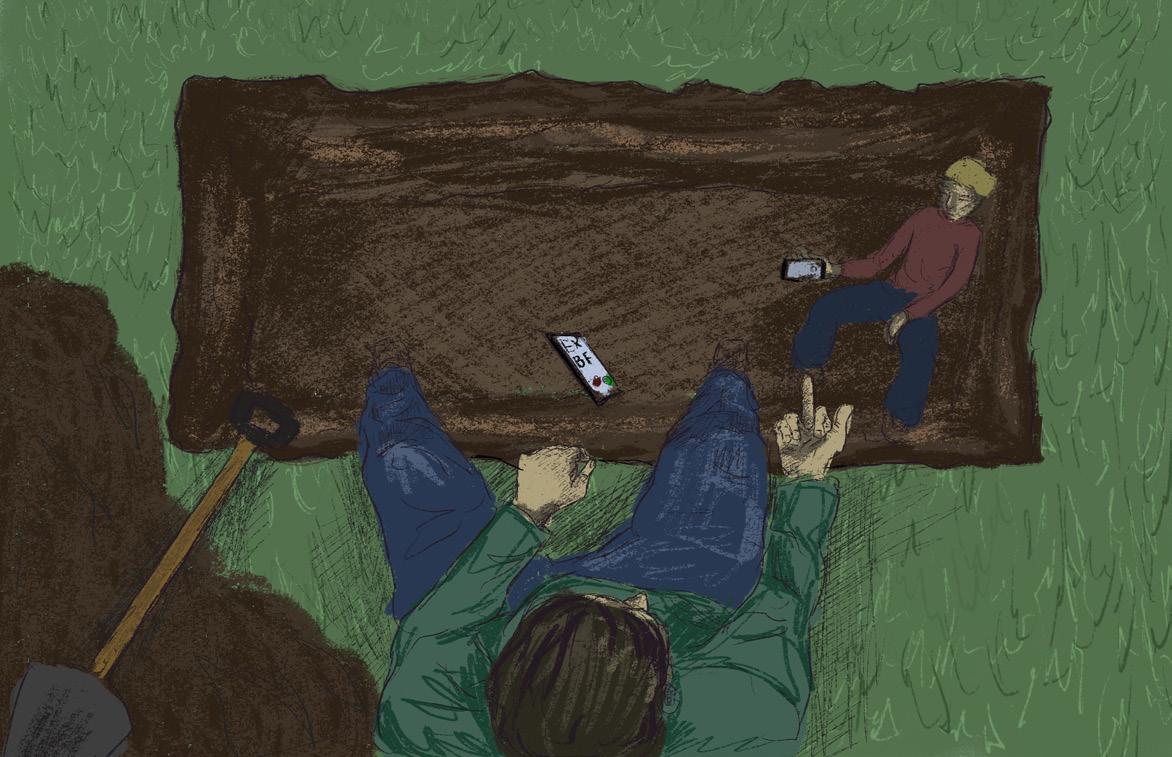 GRAPHIC MYRIAM OUAZZANI
GRAPHIC MYRIAM OUAZZANI
OPINIONS April 2, 2024 • OPINIONS 17 thelinknewspaper.ca
Lory Saint-Fleur @itsjustloryy
GRAPHIC PANOS MICHALOKOPOULOS




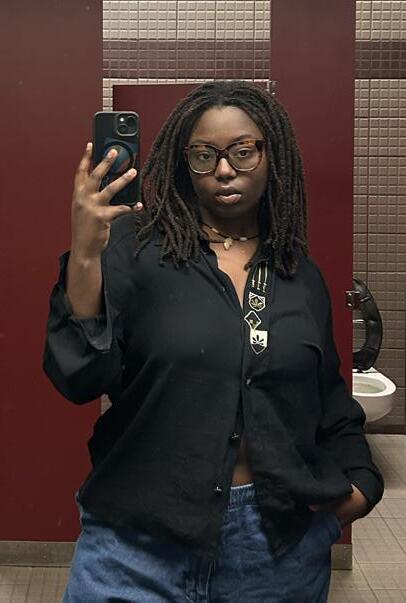
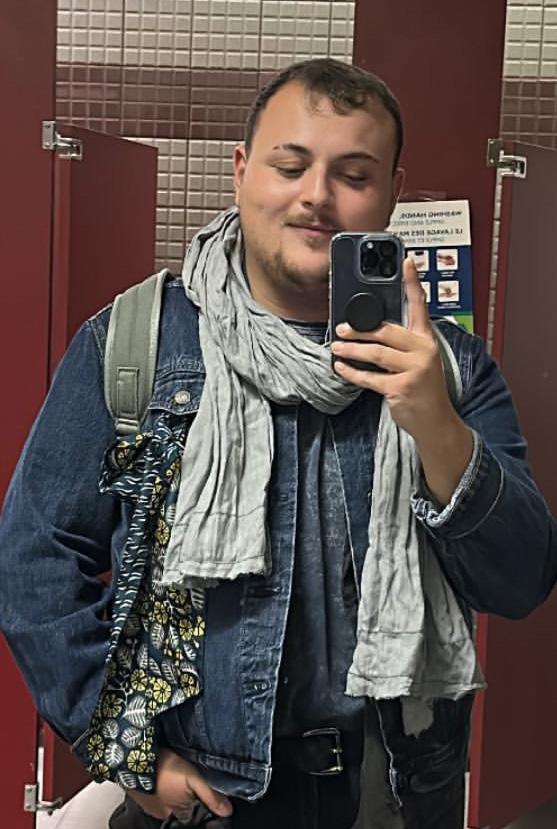



See you next year!
As we come to the end of Volume 44, we want to extend our deepest thanks to all of our readers and contributors.
Your photos, videos, graphics and articles have truly been exceptional this year, and your work is deeply appreciated.
Over the last year, more than 160 people from the Concordia community have contributed to making this publication possible, and thousands of other people who have taken the time to read and interact with our content in physical print and online.
More than 270 physical pages printed over 13 issues with hundreds of articles,
We also want to thank our incredible readership and sources for sticking by us and trusting us to bring you quality student journalism.
From all of us to everyone who made this volume so incredible,
Thank you <3 Vol. 44’s Masthead





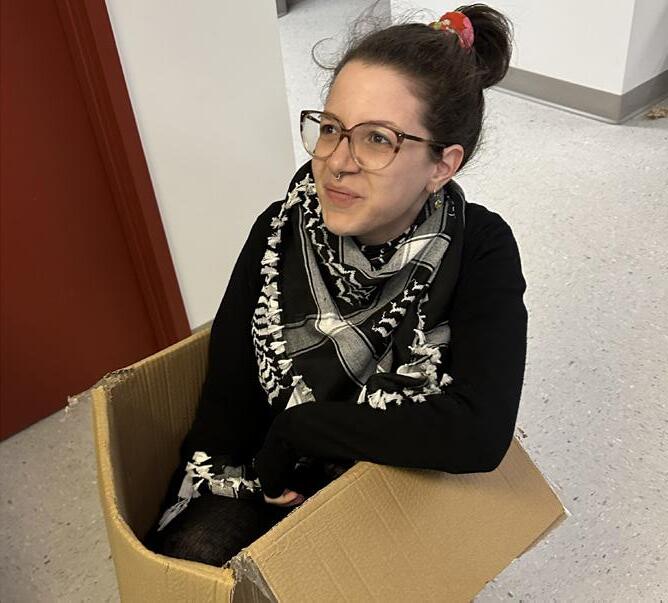

SHITS N' GIGGLES thelinknewspaper.ca 18 SHITS N' GIGGLES • APRIL 2, 2024
Copyright © 2024 SudokuTodo | For personal or classroom use only. online or make your own free printable sudoku at SudokuTodo.com Fill in the puzzle so that every row across, every column down and every 9 by 9 box contains the numbers 1 to 9.
2 9 1 3 2 9 6 4 8 9 4 8 5 7 9 2 6 4 9 4 3 1 5 9 2 4 9 6 4 2
HardPuzzle #1

The case for BDS at Concordia University
Given the ongoing protests against the genocide in Gaza, and the university community’s increased calls for a ceasefire, The Link believes the Concordia Student Union (CSU) should readopt the Boycott, Divestment, Sanctions (BDS) movement.
BDS is a call to use nonviolent means to pressure Israel into complying with international law and protecting Palestinian rights. This stance aims to end the occupation of Palestine and dismantle the apartheid system in Israel, the West Bank, Gaza and all other occupied Palestinian territories.
BDS also includes an academic boycott in regard to university communities. This includes Concordia, which is partnered with Israeli academic institutions and the state's policies of occupation, settler-colonialism and apartheid.
Israeli universities are actively involved in military research and weapons systems used by the Israeli military. For example, Tel Aviv University develops weapon
systems as well as the creation of the “Dahiya doctrine,” which is a military strategy that advocates for the use of disproportionate force.
The doctrine involves the destruction of civilian infrastructure and is a type of asymmetric warfare.
This can be seen with the Israel Defense Forces’ (IDF) collective punishment and occupation of Palestinians without making a distinction between soldiers and civilians. The doctrine has been employed in conflicts and resulted in significant civilian casualties in Lebanon, Gaza and Syria.
This direct involvement in military advancements links academic institutions with actions that have been condemned by various human rights organizations as war crimes.
A successful academic boycott was achieved at the University of Johannesburg in 2011 and resulted in the university severing its relationship with Ben Gurion University (BGU), which was undermining the rights of Pales-
tinians through the misappropriation of Palestinian water resources.
BDS has also been successful at Concordia. In 2014, the Concordia Student Union (CSU) adopted a stance with a call to action to divest all its investments complicit in apartheid.
In 2016, the CSU withdrew $5.3 million in investments tied to Israeli companies. Not only did the CSU boycott Israeli products and investments, it also announced it was boycotting Canadian Tire for selling Israeli products. Home Depot also fell under the boycott.
However, in 2021, the CSU reversed course on its boycott of Israel.
On March 13, 2024, the council unanimously voted on a motion to divest from Scotiabank, who had been accused of investing in Elbit systems which produce weapons for the IDF. Despite this specific action, the CSU has not readopted a BDS-aligned stance.
The university also continues to maintain relationships with Israeli universities.
This is obvious with Concordia President Graham Carr's trip to Israel in August 2022, which aimed to build stronger partnerships with Israeli universities. Additionally, in January 2023, Concordia received a donation of $1 million CAD, to be shared with BGU in Israel, by former Concordia Board of Governors member Miriam Roland.
The university’s neutral position, effectively upholding an anti-Palestinian status quo in the face of the ongoing genocide in Gaza— with a death toll exceeding 30,000 Palestinians—as well as its ongoing partnerships with Israeli universities involved in developing technology for military use, is inexcusable.
Concordia’s actions are a prime example of its unfair application of neutrality.
The revival of BDS by the CSU is necessary in order to combat institutional bias against Palestinian rights.
While Concordia has supposedly committed itself to decolonizing and Indigenizing its curriculum,
TheLinkis published thirteen times during the academic year by TheLinkPublication Society Inc. Content is independent of the university and student associations (ECA, CASA, ASFA, FASA, CSU). Editorial policy is set by an elected board as provided for in TheLink's constitution. Any student is welcome to work on TheLinkand become a voting staff member.
Volume 44, Issue 13
Tuesday, April 2, 2024
Concordia University
Library Building, Room LB-717 1400 de Maisonneuve Blvd. W. Montreal, Quebec H3G 2V8
Editor: 514-848-2424 x. 7407
Arts: 514-848-2424 x. 5813
News: 514-848-2424 x. 8682
Business: 514-848-7406
Advertising: 514-848-7406
Material appearing in TheLinkmay not be reproduced without prior written permision from TheLink
Letters to the editor are welcome. All letters 400 words or less will be printed, space permitting. The letters deadline is Friday at 4:00 p.m. TheLinkreserves the right to edit letters for clarity and length and refuse those deemed racist, sexist, homophobic, xenophobic, libellous or otherwise contrary to TheLink's statement of principles.
BOARD OF DIRECTORS 2023-2024: Voting Members: Caroline Marsh, Jordan McKay, Menna Nayel | Non-Voting Members: Adam Gibbard, Zachary Fortier
TYPESETTING by The Link PRINTING by Hebdo-Litho.
CONTRIBUTORS: Laura Bolanos, Geneviève Sylvestre, Kara Brulotte, Andraé Lerone Lewis, Jessica Hungate, Menel Rehab, Lana Brady, Emily DourisBlondin, Jared Lackman-Mincoff, Julia Cieri, India Das-Brown, Mira De Koven, Lory Saint-Fleur, Emma Augello.
House Ads: Adam Gibbard, Meiji Grace Estrada
Cover: Dorothy Mombrun
Corrections for Vol. 44, Issue 12:
In the article “The sporty, scientific and ludicrous art of making concrete float” on p.14, MarieLaure Filion’s name was misspelled. The Link regrets this error.
In the article “Shut Up and Dribble: She deserves to play” on p.16, graphics contributor Elmira Ayatizadeh’s last name was not included. The Link regrets this error.
The Link questions the university’s sincerity given its unabashed endorsement of Israeli institutions currently fueling a genocide.
Decolonization by nature requires dismantling systemic power structures and ideologies that perpetuate the oppression of settler-colonialism. This includes political Zionism.
Decolonizing education means decolonizing all academia, not just some aspects of Concordia’s curriculum and business decisions.
Supporting BDS is a strong step in this direction. We call on the CSU to reintroduce a clear and decisive stance in favour of divestment from the Israeli economy.
Solidarity for Palestinian Human Rights Concordia is circulating petitions to pressure the arts and science and engineering student associations (ASFA and ECA) into putting BDS motions on the ballot in their next election cycles. We urge all eligible students to sign and let our student politicians know we will not support genocide.
ZACHARY FORTIER
Editor
Coordinating Editor
Creative Director
Co-News Editors
Features Editor
Outreach Coordinator
Fringe Arts Editor
Sports Editor
Opinions Editor
Photo Editor
Video Editor
Graphics Editor
Copy Editor
Operations Manager
Systems Administrator
Bookkeeper Distribution
AUTUMN DAREY
OPEN MEIJI GRACE ESTRADA
MARIA CHOLAKOVA
INESS RIFAY
HANNAH VOGAN
PANOS MICHALAKOPOULOS
GABRIELLE LAPERRIÈRE-LEBLANC
ALICE MARTIN
ANTHONY ISSA
DOROTHY MOMBRUN
DANA HACHWA
MYRIAM OUAZZANI
CONOR TOMALTY
ADAM GIBBARD
SHREYA SAVANT
MIKE TALAMANTES
GUY LANDRY
EDITORIAL thelinknewspaper.ca
Editor-in-Chief Managing
GRAPHIC ZACHARY FORTIER
April 2, 2024 • EDITORIAL 19
JOURNALISM IS DYING , AI IS TAKING OVER AND THE WORLD IS FULL OF DOOM!
If you’re still reading this, then why not join The Link ’s editorial team?!
This ragtag bunch of misfits are still fighting the good fight, speaking truth to power and turning their frustrations into well-edited words all with a glint of hope in their eyes. It’s also just a great place to get your feet wet and make something real.
Elections for all editorial positions will be held on May 8 at 4 p.m. on zoom and in person. To be eligible you need to have staff status (contribute 4 times to The Link) before the election takes place.
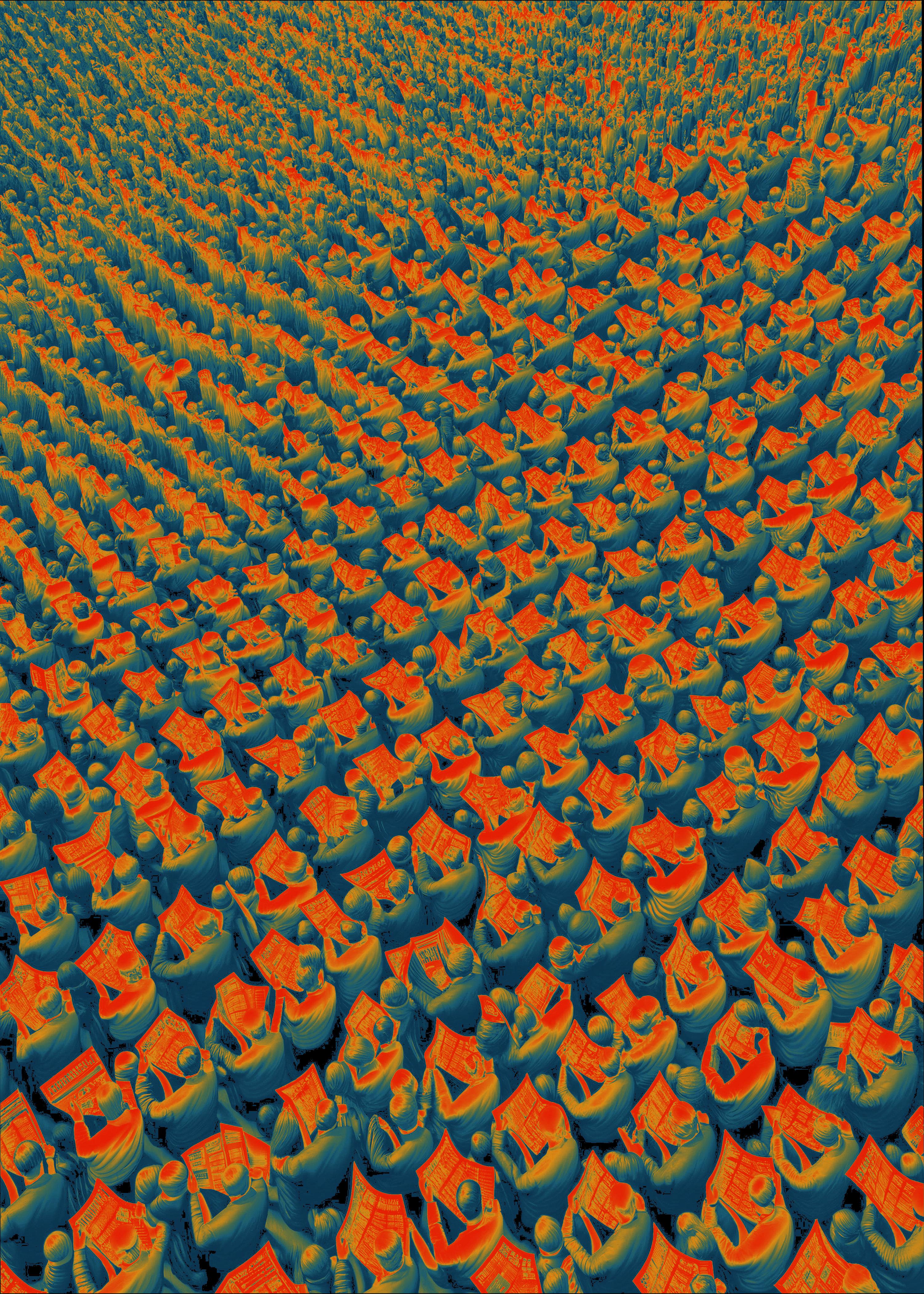
THE LINK’S ANNUAL GENERAL MEETING IS APRIL 12 AT 4 P.M.
Come review the past year of The Link and help us elect new board members and approve the budget. Those who are members of The Link Publication Society (all students of Concordia) are allowed to attend and contribute their thoughts and votes to the proceedings.
A hybrid event via Zoom and in person at The Link’s office. Snacks and refreshments provided.
JOIN THE LINK’S BOARD OF DIRECTORS!
Be part of the behind-the-scenes, helping shape and nurture The Link’s operations and future.
Two (2) positions are open to members at large (paying fees) and two (2) positions are open to members of the community who have had Link staff status within the last three (3) years. Candidates for the Board must present a letter of intent by Friday, April 12, 2024, at 4 p.m. to the secretary of the board of directors by email to operations@thelinknewspaper.ca
linknewspaper
thelinkmtl
TheLinkNewspaper
thelinknewspaper
thelinknewspaper
MASTHEAD
ELECTIONS AGM BOARD OF DIRECTORS






 MASTHEAD ELECTIONS
MASTHEAD ELECTIONS
































 GRAPHIC MYRIAM OUAZZANI
GRAPHIC MYRIAM OUAZZANI

















